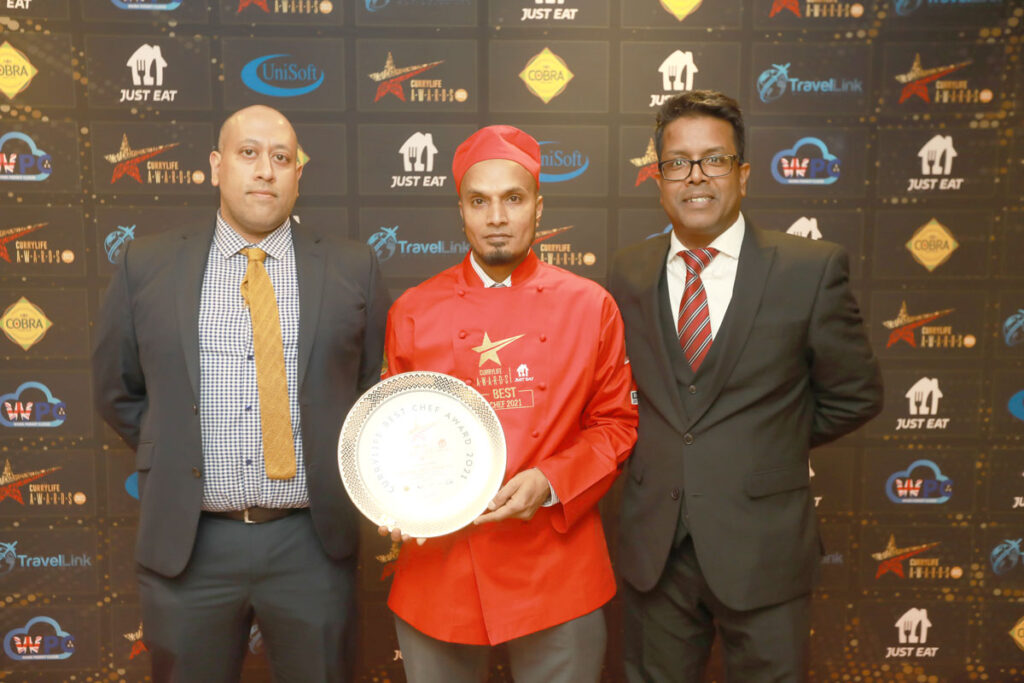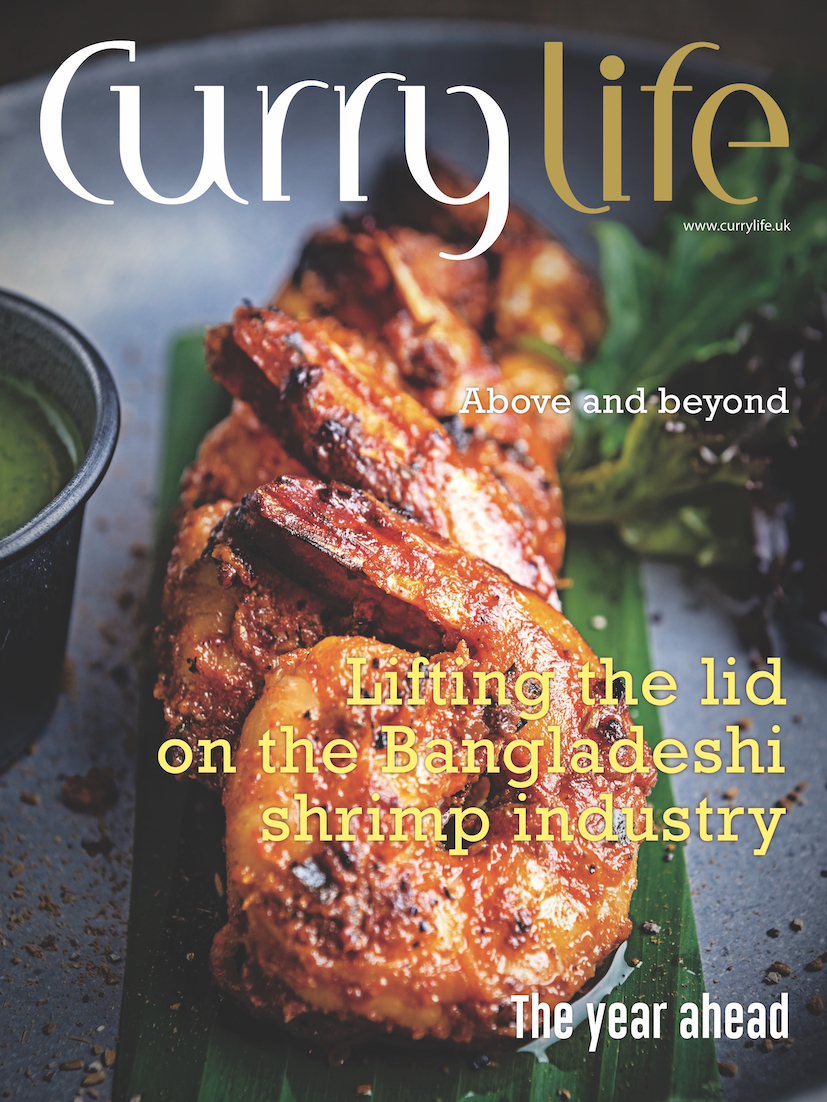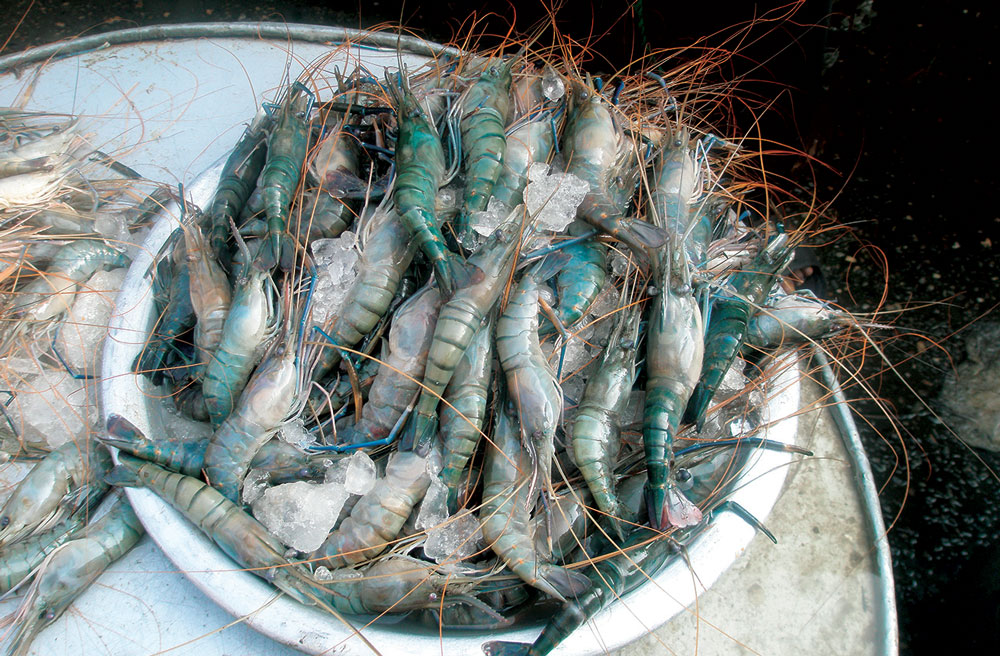
Lifting the lid on the Bangladeshi shrimp industry
Prawn and shrimp production in southwest Bangladesh ‘is crucial to public health and prosperity, whilst being climate-resilient’, according to a new study into the industry.
Carried out by The University of Stirling’s Institute of Aquaculture and partners over four years, the study is based on findings from quantitative and qualitative data collected from 240 households and 160 shrimp-prawn farms in four different communities.
It says: “Contrary to criticism in recent years of the impact of export-driven prawn and shrimp farming on communities and the environment in Bangladesh, the study found that a relatively small amount was exported, providing important income for communities, and other fish production had a low impact on the environment, whilst providing crucial nutrition.”
Researchers found that only 20-40 per cent of all the fish produced – the shrimp and prawn – was destined for export, with a high diversity of other fish being produced, sold and consumed locally in mainly small-scale enterprises.
PhD researcher Abdullah-Al Mamun, lead author of a paper presenting the findings, said: “There has been very little research into the detail of what’s happening on the ground in Bangladesh, to counterbalance global discourse about food security and trade liberalisation. There has been criticism of the effect of prawn and shrimp export on communities and the environment.
“This study is important, because it shows that the family-driven, polyculture system currently in operation in southwest Bangladesh actually safeguards household nutrition and income, whilst requiring far fewer inputs than the intensive systems in operation in other places, making it better for the environment.”
Four areas of gher dikes (where rice, fish and vegetables are grown together) were studied: high saline (coastal), medium saline, low saline and freshwater (inland). Forty households farming fish from each area were chosen at random, and underwater biodiversity was measured.
Dr Mamun said: “As well as prawn and shrimp, we found 52 other fish species growing in the water across the four areas, which is surprisingly diverse, as well as a range of vegetables. The prawn and shrimp for export brought in the highest price for households. The other 52 fish species and the vegetables were consumed and sold locally.”
The study also found that very few inputs were needed to grow the fish, making the impact on the environment low. It was overseen by Professor Dave Little at the Institute of Aquaculture.
He said: “The data-set in this study was of an extremely high quality. The results send a clear message that consumers can safely eat Bangladeshi shrimp, knowing they are also supporting local people being able to eat more nutritionally valuable seafood.”
Read more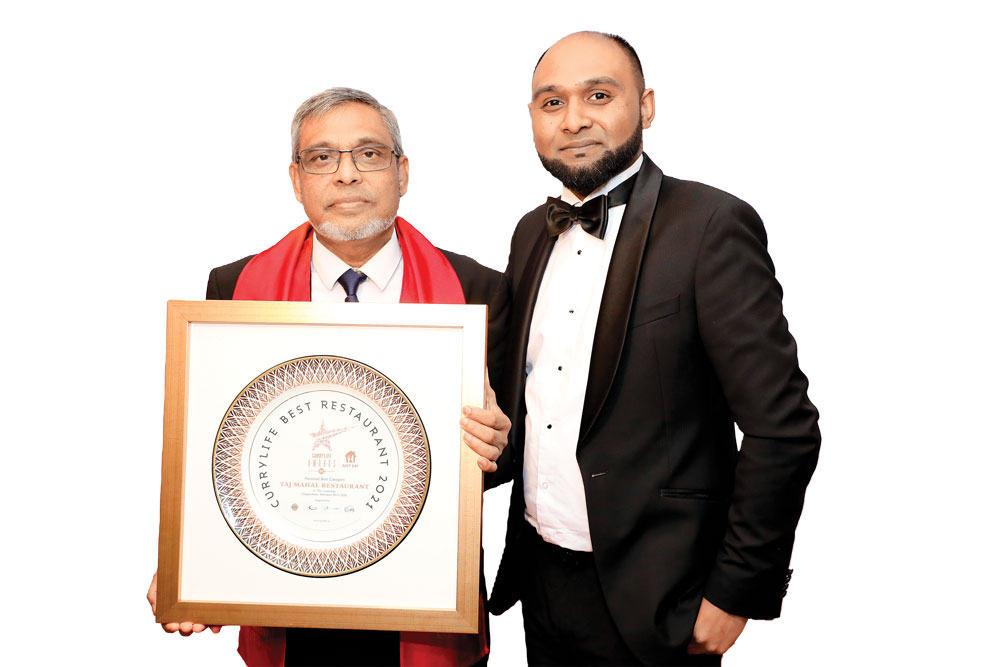
Making a Difference
Arju Miah MBE, owner of The Taj Mahal in Chippenham, tells Curry Life how his achievements have had an impact above and beyond the hospitality industry
Arju Miah MBE has been involved with several restaurants since his arrival in the UK in 1980. The one remaining is his longest-standing venture, the 48-seater Taj Mahal in Chippenham in Wiltshire, which opened in 1989.
“My intention when I came to the UK was to one day have a successful business so I could stand on my own two feet,” he says. “Owning a business meant I could have a bit more freedom and hopefully provide security for my family.”
When he first came to England from Sylhet in Bangladesh, Miah started as a kitchen assistant, before working his way up to being a chef, with all his training done on the job. He opened his first business in Reading in 1984, before moving onto other restaurants in Sussex and Suffolk over the following years. He suffered some serious burns on his arm following an accident at work while cooking, but undeterred, he took a couple of months off, got married and eventually settled on Chippenham as the location for the Taj Mahal.
“I live in Swindon and Chippenham is an easy commute, I also believe it is one of the nicest towns in South West England,” he says. “There have been big changes in recent years – many people are moving here from London for example, as they can get more for their money and the travel links to London and Wales are good. When I started in Chippenham I invited local dignitaries, members of parliament and the chairman of the district council and I gave them an overview. Word of mouth spread and my restaurant’s reputation grew with publicity.”
An entrepreneurial outlook
The restaurant has built a loyal following over the years, with Miah referring to customers as ‘extended family members’. It has been shortlisted for and won several awards over the years in recognition of its food and service and most recently was named Best Curry Restaurant 2021 at the Curry Life Awards. Some of its house special dishes include Taran Special, featuring meat cooked with potatoes, egg and whole green chillies, infused with madras heat and Joy Pur, meat with onions, capsicum, garlic and ginger sauce with garlic mushrooms on top.
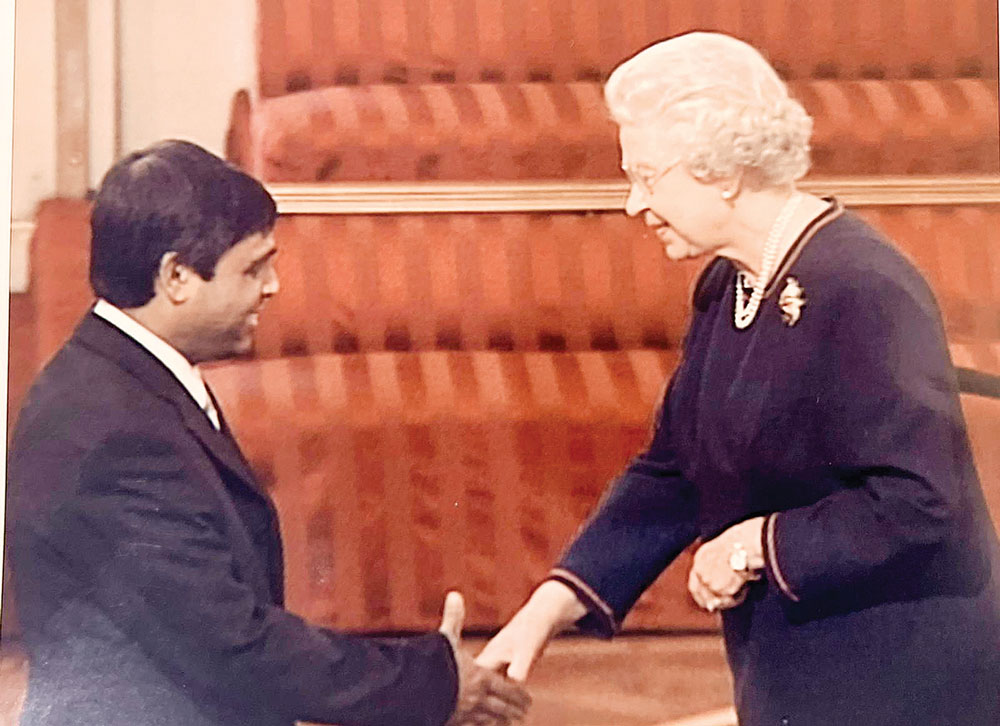
“I started off as a chef but I also love working front of house – one of the advantages is that I can meet many business people and the local community,” he says. “I’m an all-rounder in business, looking at
all aspects. I worked for two years as the chef, then trained my colleagues and moved to front of house. We change the menu every one to three years and refresh some of the dishes, alongside ensuring we have the staple ones that our loyal diners enjoy. But it’s not just about the curry – you need to have food and service combined at a high level.”
Testament to his loyal customer base is the support he received over the various lockdowns, while the Covid-19 pandemic was at its peak. The Taj Mahal continued to trade, catering for large numbers of takeaways, which meant Miah was able to keep all his staff (one employee went to Bangladesh but returned to the restaurant one year later).
“We received some government grants during lockdown to help support the business and I retained all eight of my staff,” says Miah. “Covid taught us all a number of lessons: about discipline, respect and how to keep our distance! It made us all more patient.”
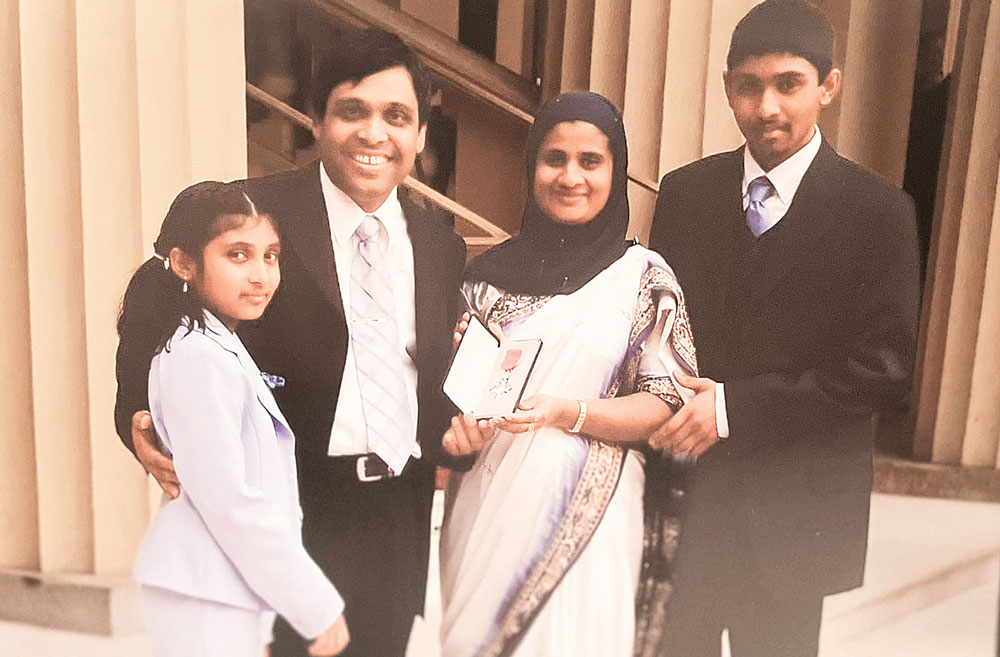
Miah’s other restaurant ventures include the one in Reading in 1984, another Taj Mahal that opened in Swindon in 2010, which he sold three years later and Miah Indian Cuisine, a 250-seater restaurant, also in Swindon, which opened in 2010 and which he sold in 2014 and which also won awards.
“I have tried restaurants that are both big and small and am proud of my achievements,” says Miah. “My plan is to train my sons to take over the existing business but I like to keep busy and there is plenty keeping me involved. I am still very interested in cooking and am often helping my chefs.”
Miah says current staff shortages are very detrimental for Indian restaurants, and could result in many disappearing altogether, unless the government proposes a more flexible work permit policy.
“We need better training facilities for the next generation of chefs – I am lucky as I have my children who are able to help,” he says. “But the restaurant industry is a challenging one to be involved in and perhaps not so appealing to the younger generation. We could train people on the job as a training college would be too expensive but the visas and red tape are also prohibitive,” he says.
Community champion
Miah is proud of his achievements as a restaurateur and his community achievements have created an equally lasting impression, leading to Her Majesty The Queen awarding him with a Member of the British Empire (MBE) in 2003, for his charity work. He has been actively involved in many charities and helped raise funds for a range of causes over the years.
When Bangladesh was devastated by a cyclone in 1991, Miah helped to raise funds and collect items of clothing for those in need, alerting newspapers and the local Member for Parliament to the situation.
“We are all human beings at the end of the day – some of us are fortunate in terms of what we have but others are on the streets,” he says. “I am committed to giving those less fortunate the chance to have the same opportunities I have had. However small my actions, I am helping to make a difference.”
Miah was also involved in raising funds for the Bangladesh Female Academy, a free school for girls from deprived areas of Bangladesh, and he visited Bangladesh for the opening of the school in 2006. This was the first such institute in Bangladesh where those who couldn’t afford an education could receive one for free. Other achievements include fundraising for Cancer Research for Wessex Children’s Hospice.
Miah has also held several prestigious positions with the local community and the wider field. He was president of Chippenham and District Chambers of Commerce and Industry from 2000 to 2002, the first Asian president in the body’s 100-year history. He was also the founder vice-chairman treasurer of the Bangladesh Association Swindon Area. In 2020, he was given a Lifetime Achievement Award at the Chippenham Business Awards.
“I want to be the best I can in my business and in my community life,” says Miah. At 63 years of age, his philosophy remains much the same as it was when he started out many years ago and shows little sign of slowing down.
Taj Mahal
51 The Causeway,
Chippenham SN15 3DD
Tel: 01249 444350
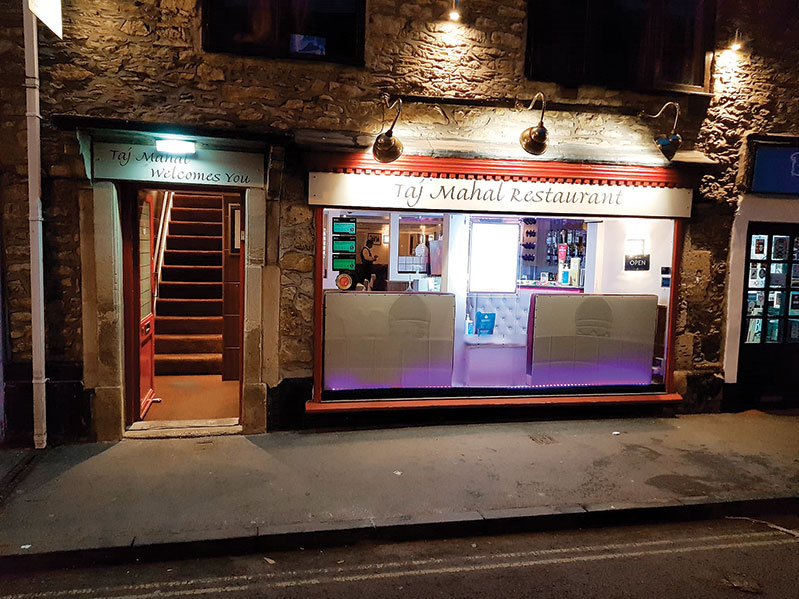
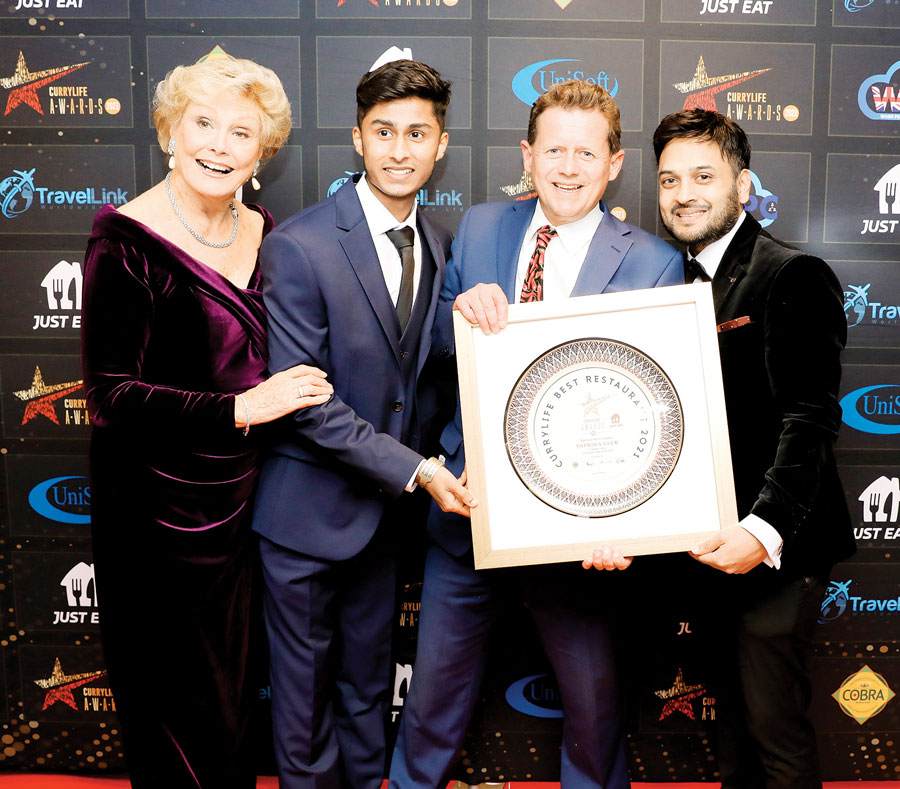
A Club Above the Rest
A Club Above the Rest
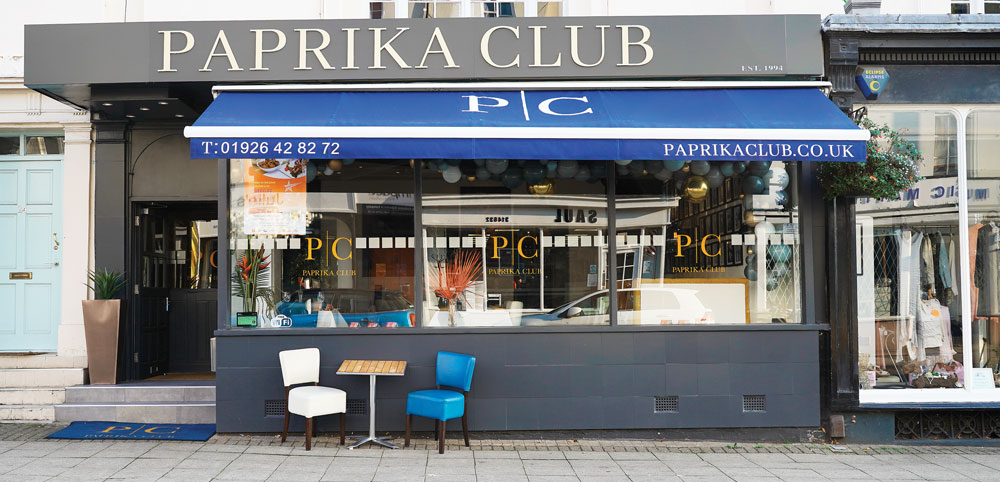
Paprika Club is wowing diners with its refined dishes, its contemporary design and its consistent approach
Located in Royal Leamington Spa, Paprika Club has been welcoming customers since 1994. The 90-seater restaurant, opened by Mohammed Azad on the former site of another Indian restaurant, recently unveiled an extensive refurbishment, carried out during the various lockdown periods in England. The result is a restaurant with a more sleek and modern look, featuring bold blue and yellow colours and subtle lighting.
“We put together a new colour scheme, changed the furniture, the crockery and the lighting – the only thing that has stayed the same is the floor,” says Azad, who manages the business alongside his nephews and sons. “We decided that when we reopened post-Covid, we wanted to do so with a wow factor, so we could give customers a memorable welcome back after so many months of closure. I get bored of things staying the same and make changes every few years. During lockdown, we were open for takeaways but dining is our main business, and with the time on our hands, it made perfect sense to renovate.”
Azad adds that the new-look restaurant has had a marked influence on the atmosphere and the types of customers visiting, with many people dining at Paprika Club for the first time, alongside the restaurant’s loyal customer base. Having won ‘Best Curry Restaurant’ at the 2021 Curry Life Awards has also attracted many new customers.
“Diners who have visited since we reopened thought we were a new restaurant, they hadn’t noticed us before,” explains Azad. “Many others walking by stop and have a look and tell us it’s inviting. There is a lot of competition in town and further afield but if you want to rise above the others, you don’t just have to do something – you have to do it well, regardless of the competition.”
Changing times
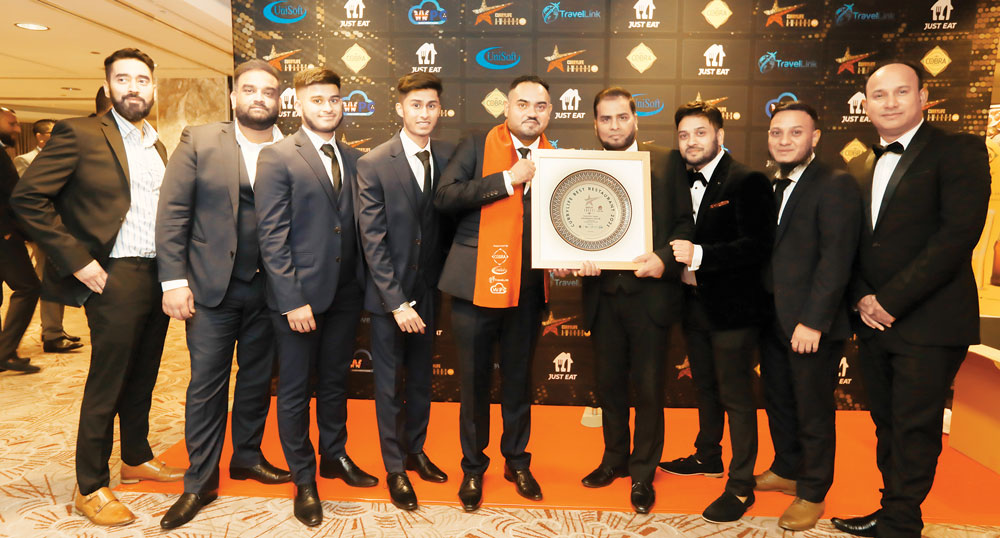
Azad believes that constantly delivering what customers – new and old want, providing good service and food and – crucially – maintaining these standards, is the reason for Paprika Club’s long-term success.
“The concept of eating at an Indian restaurant has very much changed over the years,” he says. “Restaurants were busy between 6pm and 9pm and then again once the pubs closed at 11pm. When licensing laws changed, so too did customers’ attitudes – now it’s about dining out and having an experience rather than just eating curry. What has really changed is the presentation of the food – people want more refined dishes. And with the competition, we have to ensure we are consistent at every customer touchpoint, whether we are serving at 6pm or 9pm.”
Popular dishes on the menu include the classic chicken tikka masala curries and jalfrezi dishes but Paprika Club also has a number of more unusual dishes. These include signature dishes such as a goan fish curry, with Bangladeshi freshwater fish, prepared with garlic, mustard seed, curry leaf, peppers, onions and tomatoes and ‘sea bass supreme’, marinated with fish spices, turmeric and garnished with baby aubergine. There is also ‘A Sylheti Special’, featuring diced chicken with selected spices and scotch bonnet and ‘Hot & Spicy with Potato Straws’ – meat prepared in a hot and spicy sauce, garnished with potato straws.
“Winning our Curry LIfe award – Paprika Club’s first-ever award, has definitely boosted our business – and it is so pleasing and satisfying to know that our customers voted for us,” says Azad. “We are proud to have that endorsement, particularly with the local competition and it’s encouraging people from around Warwickshire and further afield to come and visit us. We need to maintain this level of service and give customers what they want.”
A family affair
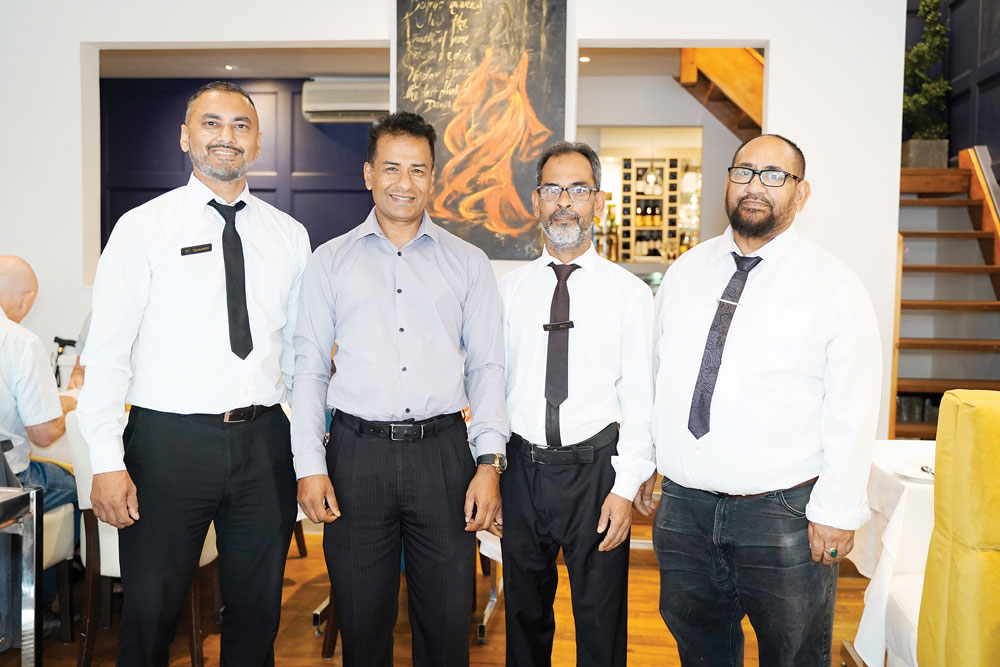
Having travelled from Bangladesh to Birmingham (where he still lives today) as a young child in the 1970s, to join his father who was already in the UK, Azad was drawn to the hospitality industry by his brother, who was working as a chef in his own Indian restaurant at the time.
“My father worked in a factory but as a family we have been involved in the restaurant industry since 1982, when my brother opened one in Stirchley in Birmingham and then also in Knowle in Solihull,” explains Azad. “I learnt everything on the job. We are using the same recipes from my brother, who was a very experienced chef. He is retired now but we still use some of his methods and he advises us now and again.”
Staffing is a constant worry for Azad but he counts himself lucky in that he has loyal members of staff, some who have been with him for 15 years or more (his chef has been there for 18 years) and also an extended family whom he can rely on. Two of his nephews run the business alongside him and several of Azad’s brothers help out at short notice while his children also fit in regular shifts around their university degrees.
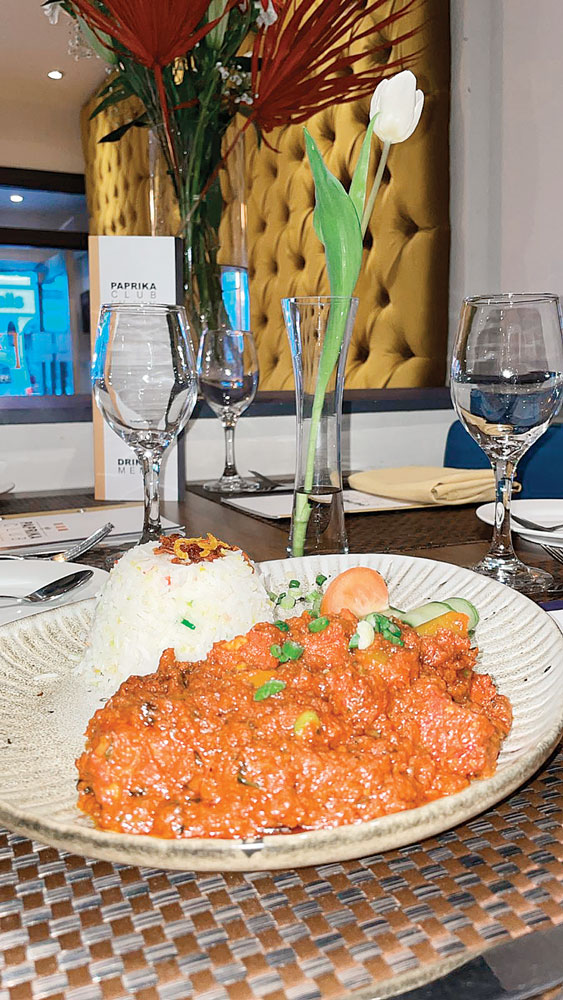
“Everyone who works here has their own role, whether that is managing social media or front of house or the kitchen – you can’t do everything yourself,” acknowledges Azad. “You can try but you might not be that efficient.”
Still, he believes more needs to be done to attract staff – with Paprika Club open seven days a week from 5.30pm until 11pm, Azad has only been able to take one day off from work in the last three months and admits that when the restaurant has busy periods, he can often be found cooking dishes in the kitchen.
“I am fortunate because my family can help out if necessary, but the government could do more to ease conditions for work permits so that we can employ staff from abroad,” he says. “I cook when I have to – I have many talents and if I need to step in then I will. Customers do not want to know your problems – you have to be able to deliver.”
Azad anticipates that many restaurants will close down in the next five years, due to staff shortages and the challenges and expenses involved recruiting from abroad.
“It’s not a quick fix and the shortages are impacting all sectors, not just hospitality,” he says. “I’ve done more grafting in recent months than I have in the years since we opened.”
As Azad explains, he has got to where he is through hard work and he has to continue to meet the demands of customers and of the business.
“If you are complacent, things will rapidly unfold – getting to the top is easy but keeping things at that level is the hard part,” he says. “The restaurant has got to where it is now because I am passionate – if you don’t have this passion, you can’t get motivated. I’ve put in more hours and carried out extra shifts to meet the demands of the service. This has put more pressure on me but ultimately, it’s rewarding. When the going gets tough, i have to keep going: 27 years on, I still enjoy talking to customers and providing good service”
Keeping customers coming back for more
Paprika Club is keen to promote the business on social media – as Azad puts it, ‘it’s amazing how quickly things can get around’, with one of Azad’s sons responsible for social media updates, including posts and images on platforms such as Facebook and Instagram. The restaurant also launched a loyalty scheme when it reopened after lockdown, offering returning customers a 10% discount on their bill.
Any thought of retirement is very much in the future, with Azad’s focus very much fixed on the present time and ensuring the restaurant continues to maintain its high standards. Opening other Paprika Clubs in nearby areas would be a tempting prospect, but overcoming staffing issues would be too challenging, for the moment at least.
“I have got ideas about branching out and creating some more Paprika Clubs but I would need the right staff,” says Azad. “The reality is that if you can’t do something well, just don’t do it. Here, I am maintaining our high levels of standards and service; if I was to open another restaurant now, in view of the current situation, it would be difficult and not to the level I want to achieve.”
Paprika Club
22 Regent St, Leamington Spa, Warwickshire CV32 5E
paprikaclub.co.uk, Phone: 01926 428272
Read more
Helping Hand

Work Permit Cloud provides sponsor licence applications and HR software services to a range of domestic and international clients.
Work Permit Cloud was set up in September 2020, and specialises in business immigration and UK Visas and Immigration (UKVI)-compliant HR systems. It’s an optimum time for such a business, on the back of changes following Brexit and the current staffing crisis affecting the hospitality sector, with many Indian restaurants across the UK reporting struggles with staff recruitment and retention. A sponsor licence is now necessary for those who wish to sponsor foreign workers to come and work in the UK.

Founder Lutfur Rahman, a qualified lawyer who also describes himself as a ‘community activist’, carved out a niche in this area long before, having operated a similar practice in the early 2000s, just prior to the ‘Sector Based Scheme’ being introduced. The Scheme, which came into operation in 2003, allowed UK employers to recruit a limited number of non-EEA workers aged between 18 and 30, for temporary employment (for a maximum of one year) in selected low-skilled jobs in the hospitality and food processing sectors. After a year, these workers could be granted permission to remain, thereby transitioning into a more permanent immigration status. The scheme was open to people from all countries but most applicants came from Eastern Europe and Asia.
“I started with work permits, I wanted to make the employer journey easy,” says Rahman. “It’s an area I love working in.”
A booming business
Rahman’s business at the time, Universal Legal Centre, was set up with two other practitioners. He now practises from Saint Martin Solicitors where he leads the immigration team. We’re meeting at his offices in Whitechapel but such is the demand for his business that Rahman is now planning on opening a second, smaller office within the Gherkin building in the City of London in April.
“When the Sector Based Scheme was introduced, you didn’t need so many skills at that time – people could apply to work as kitchen porters so we captured much of the market for Indian restaurants looking for staff from abroad,” recalls Rahman, “At one stage, I had to recruit extra staff myself – up to 20, we created a real buzz. Post-Brexit, with the skilled service route, demand has picked up again.”
Rahman initially did a trial immigration service, with business initially coming through Saint Martin Solicitors, but within six months and around 150 applications later, it was clear that demand was there, leading him to set up Work Permit Cloud.
Having been in the immigration business for some time, Rahman says he is well known within the local Bengali community. He clearly has a passion for all things immigration – spending most of his working hours researching legal updates, changes in immigration rules and procedures, legal precedents and finding solutions and remedies for his clients.
Demand is heavily weighted towards arranging paperwork for those in Bangladesh, which makes up 80% of the business, while India and Pakistan make up 10% and the remaining 10% is from other countries. Indian restaurants account for around 60% of clients but increasingly, Rahman is seeing demand from other sectors, such as travel agencies and construction firms.
Rahman says the sponsor licence application process takes around eight weeks, and his success rate to date is around 99%. He has scaled the business impressively since 2020, amassing around 500 clients in 18 months. During busy periods, his office can handle between 40 to 50 applications in a month.
“I get so many calls and I am thrilled when people are able to come over,” he says. “I have done something that is good and that will have a positive effect on the local community.”
Beyond immigration
And Rahman hasn’t stopped at immigration. Last September, he launched a software service that helps businesses put in place a robust human resource (HR) management system, to help manage employees. Essentially, he says he offers three services: a sponsor licensing application, a recruitment service and a visa service. Custom-built software, which took Rahman around a year to develop, helps individuals and organisations to comply with the Home Offices’ UKVI guidance for skilled worker routes. By using the software, businesses can apply for a sponsor licence and once businesses are successful with their application, the cloud-based platform enables them to easily comply with sponsorship duties.

Rahman says the software helps both recruiters and job seekers to attain their personal and business objectives such as finding the right job with a UKVI regulated employer.
“There is a lot more paperwork involved with the current process but the software helps manage this efficiently,” says Rahman. “The Home Office is carrying out checks more often, and this helps keep details in order, as well as providing a range of other HR tools.”
For example, employers can easily make sponsorship licence applications with the correct set of documents, even with a limited understanding of complex sponsorship licence applications and management processes. The software also helps to raise awareness among employers and employees about the importance of recording and reporting any change of circumstances, such as a change of address. It also supports HR best practice across a number of areas, including recruitment, equality and diversity and Inclusion, home working, flexible working, discipline and grievance procedures, working hours, pay and wages, pension, leave, holiday, and sick pay policy.
Pricing for the various services depends on the number of users accessing the software, with fees for micro-businesses (1 to 10 users), small business (1-30 users) and medium business (1 to 50 users), although larger businesses can also be catered for.
Spreading the word
Word of mouth marketing and having a presence at various Asian-themed award events has helped to boost Work Permit Cloud’s reputation among the community and wider afield and Rahman now has a growing number of staff members, from countries as varied as Nigeria, Albania, China and Bangladesh.
It’s clear that he likes to keep himself busy and enjoys the business of immigration. As one employee says: “As a boss he has the vision and the mindset to provide solutions for employers. He’s also a great coach and mentor; whenever we have any queries or need some help, he’s right here.” Alongside his expertise with regards to immigration issues, Rahman has also owned a yoghurt factory and been involved in a cash and carry business. But those are stories for another time.
WorkPermitCloud Limited
2nd Floor, 112-116 Whitechapel Road, London, E1 1JE
www.workpermitcloud.co.uk
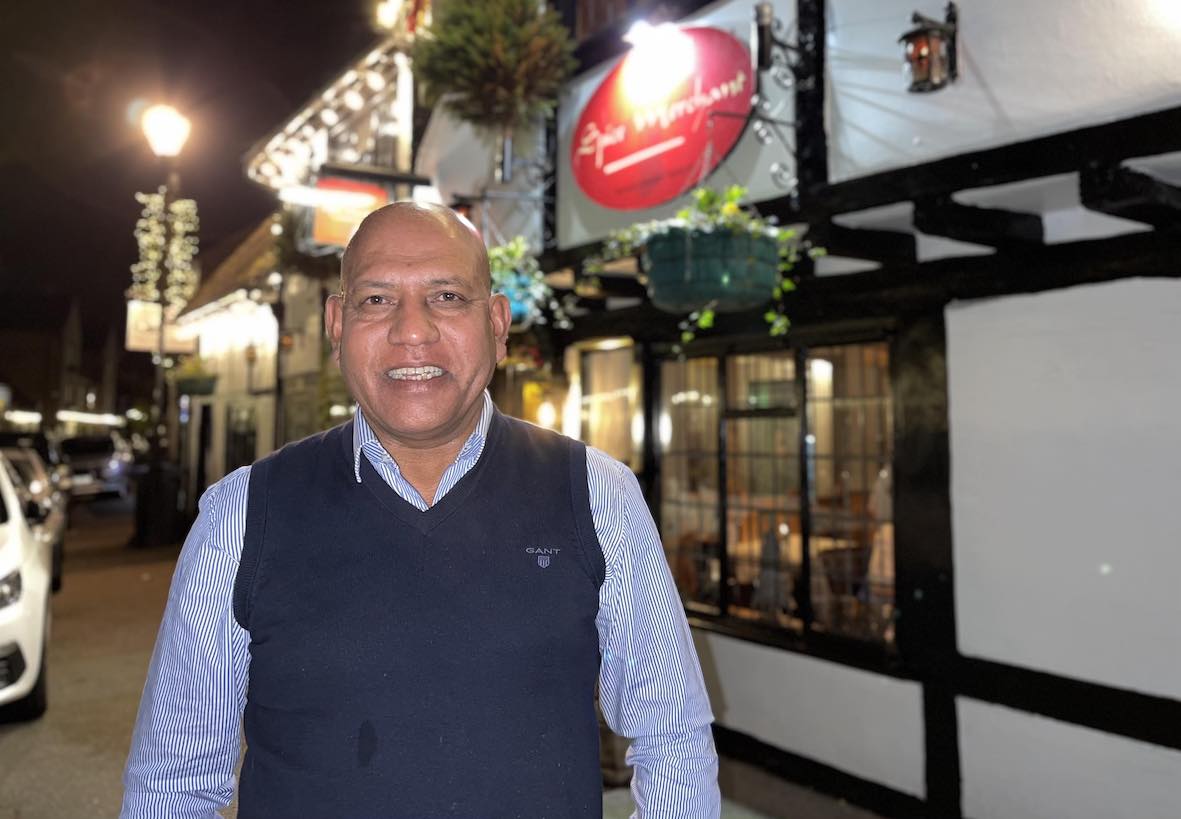
Above and Beyond
Curry Legend Bashir Islam has been an inspiration to the curry industry for many years, with an approach based on mutual respect
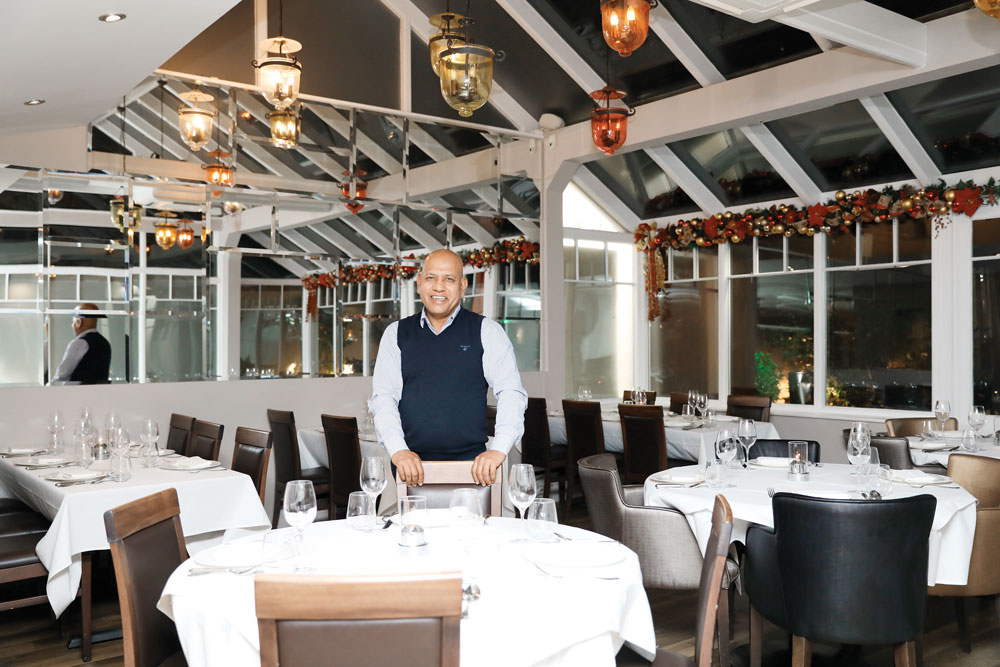
Restaurateur Bashir Islam’s motto is simple: ‘promise less and give more’. His philosophy in life is to give people more than they envisage, to over-deliver and to exceed expectations across all areas of the business, from the kitchen, to the service to the front of house.
We’re meeting at one of Islam’s three restaurants (although over the years, Islam has been involved in plenty more). The Spice Merchant is located in the historic area of Beaconsfield Old Town in Buckinghamshire, with the other two (also with the same name) in Henley-on-Thames and Cookham, and describes itself as serving ‘contemporary Indian cuisine’. On the menu, it says, you’ll find ‘traditional Indian pot dishes, such as Bhuna and Jalfrezi as well as a selection of more modern and creative dishes’. The decor reflects this approach too, with wooden floors, large mirrors and opulent lighting.
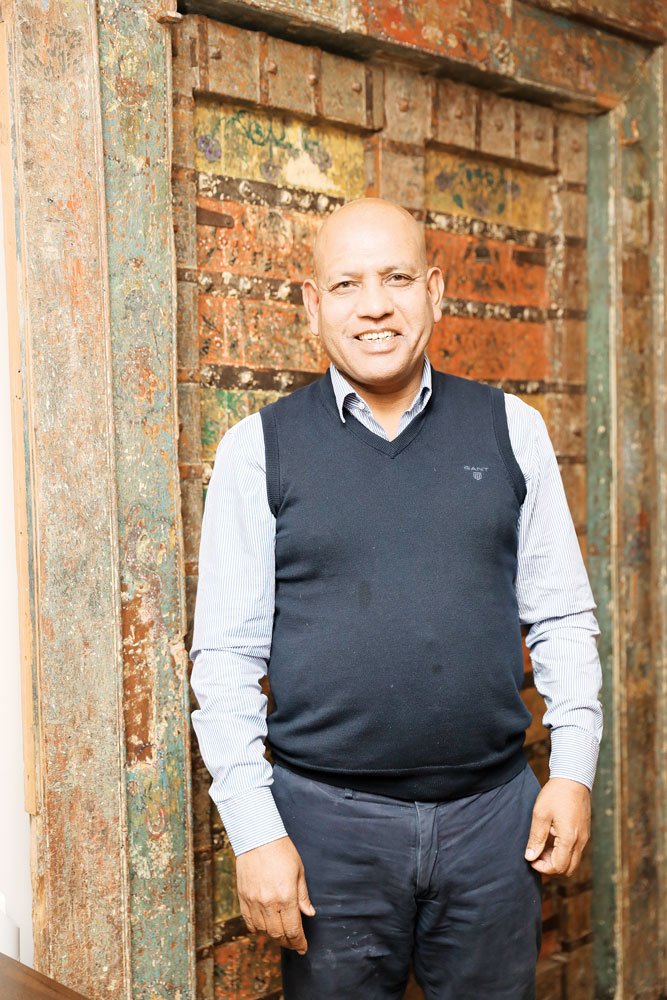
Bashir Islam came to the UK in 1976, working in a succession of Indian restaurants in various locations, starting in Palmers Green, moving on to Crystal Palace, then Leyton and also Portsmouth. He then completed stints at restaurants in Uxbridge and Gants Hill, before settling in Beaconsfield. His first restaurant – Tropical Curry, was opened in 1980 in the modern part of the town and, he recalls, was the first such Indian restaurant in the area. In 1983, he opened his flagship restaurant, The Cookham Tandoori, in partnership with his brother (now called The Spice Merchant Cookham) and then in 1994 the one where we are sitting today. The Henley restaurant opened in 2005.
Many chefs cut their teeth at the Cookham restaurant, before embarking on their own hospitality ventures and founding successful businesses of their own. Bashir has also helped to fund many of these, providing start-up capital (rather than going into partnership) and being an inspiration for many in the curry industry,
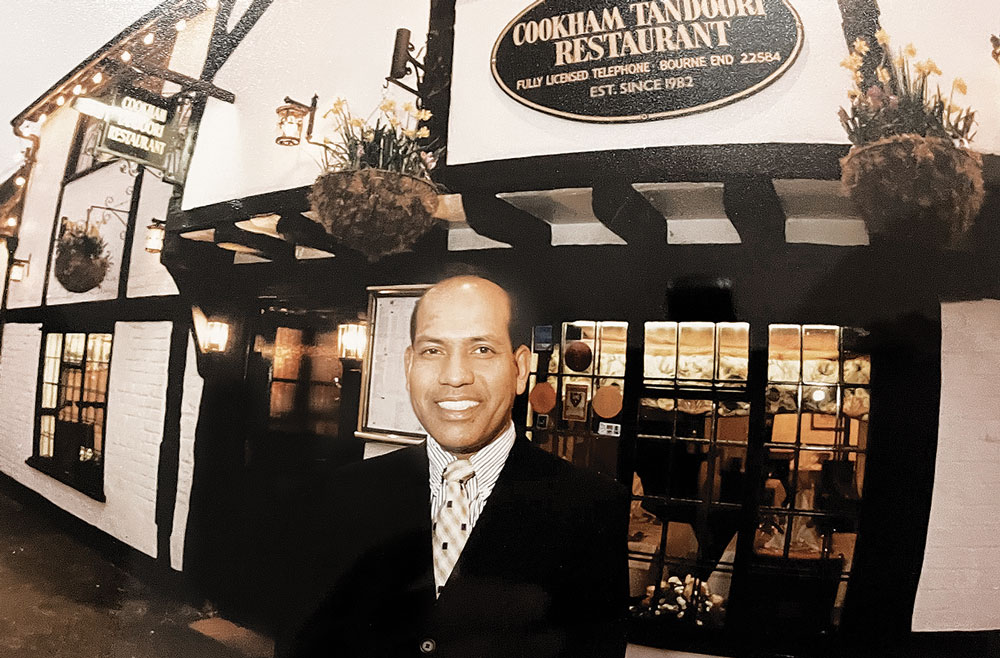
He shies away from being called an inspiration to the industry and a business mentor, however and doesn’t believe he has done anything too differently from anyone else. He says his approach is down to a simple premise: if you treat people well, they will respect you and stay with you. And similarly, he says, do not work for someone who doesn’t respect you and always ensure you take pride in your work.
“I never forgot who I am, and where I came from and that is why a lot of people lose their way,” he says. “You must not forget who you are or your identity – once you lose this you have nothing.”
A family approach
Bashir likes to put the emphasis on creating a family environment at his restaurants, where everyone is welcome, whatever their role.
“When you work here with me it’s like a family because I worked for others before and have been treated very badly,” he says. “I thought this was not right – people who work for me, this is like their home, they should feel comfortable. If people need help, I want to be there for them. Indian restaurants do not do things by the book – everyone is our friend, we are like one big family. Everyone is capable of achieving anything and we try to give people what they want.”
Testament to this is the fact that many of his former staff speak very highly of Bashir, and remember him for the level of training he offered – not just with regards to the food business but around customer service too. As one employee explained while we were there, his success is down to what Bashir has taught him. Bashir too says he has not come across a single person yet who has previously worked for him and doesn’t want to talk to him again.
“Most of my staff started with little or no experience, I trained them from zero and occasionally brought some in from other restaurants,” he says. “Anyone who works with me knows what is expected of them; it’s an amazing cultural experience working in a restaurant. As an owner I can provide nice lighting and supply the food, but cooking and serving dishes is all down to the team. So if you book for dinner and the person serving you is not properly dressed or does not have a clean appearance, you are not going to eat there.”
A people business
Bashir Islam is also astute, being able to spot the right people to work with and bringing out the best in them. He acknowledges that one of the biggest challenges throughout his time in the industry has been finding the right staff. While he might have many ideas that have proved successful, he says you can make so much more of these, and the prospects are much more exciting, if you have the right staff by your side.
He’s also spotted gaps in the marketplace, and as he puts it, ‘been able to seize an opportunity.” The Spice Merchant for example has its own online delivery system, called Feast Online.
“I see things a good many years before others,” he says. “If you look at the likes of Just Eat, I created Feast Online. I could see that many Indian restaurants were proving to be very popular but we needed to get quality food delivered to people’s doors. I invested money in establishing this online food delivery system for my restaurants.”
Enjoy what you do
While not a trained chef, Bashir also enjoys creating dishes, and has put his own stamp on the menu at The Spice Merchant, including a take on Chicken Tikka Masala, with lots of spices to give the dish a bit of a kick.
“I am not a chef and have never been one but I have a very good understanding of food,” he says. “I use top-quality products – I like going to markets and seeing fresh produce, I can’t compromise on quality. And you also need to understand spices and why you are putting a particular one into this curry over that one. If you don’t enjoy it, it’s quite simple – don’t do it.”
At the age of 65, Bashir acknowledges that he is close to retirement (neither of his three children are interested in taking on the family business) but that hasn’t stopped him thinking about new ventures – he plans to open a fish and chips shop in Henley.
“I don’t know how it will work, I am too old to do this job,” he reflects. “The only thing I say to people who are thinking of opening a business is to make sure you give everything you have within yourself. Never undermine your competitors, respect them. And if you don’t know something, study what is already out there, but always think about how you can do it better. Learning never finishes. Don’t do something for the sake of it. If you are not happy with something don’t sell it, if you can only serve 10 people tonight then don’t serve 12. You might lose two customers today but the other ten will come back again.”
Spice Merchant Cookham, High St, Cookham, Maidenhead SL6 9SL, Phone: 01628 52258
Read more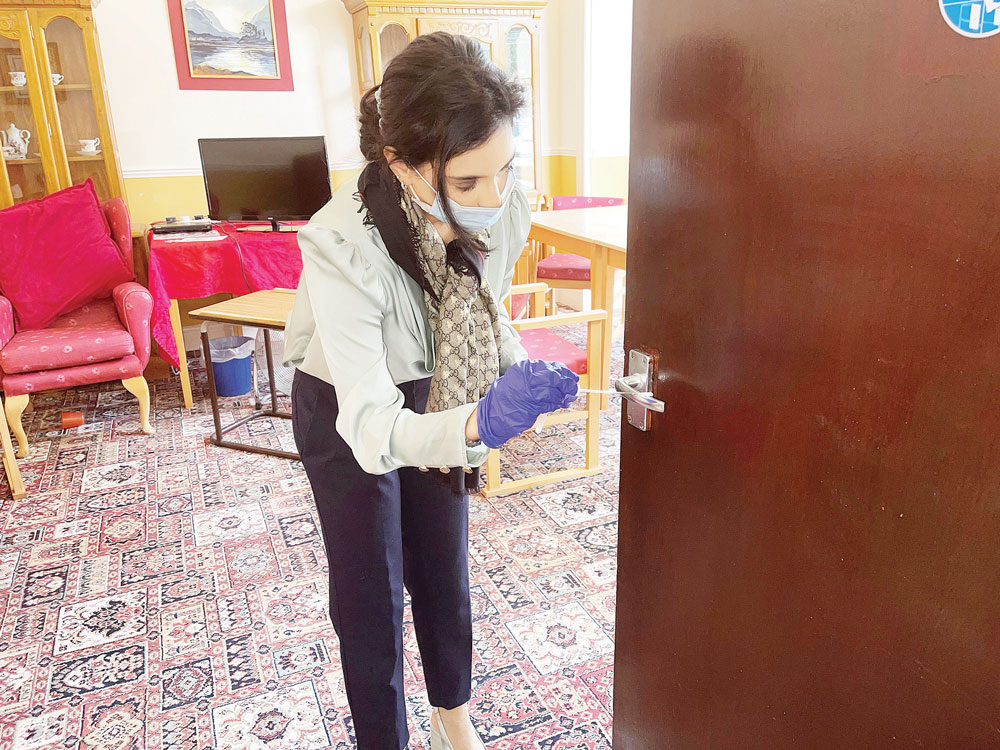
The future’s bright
Curry Life finds out how a young female scientist has gone from working in her family’s Indian restaurant to inventing and commercializing a spray to help combat Covid-19
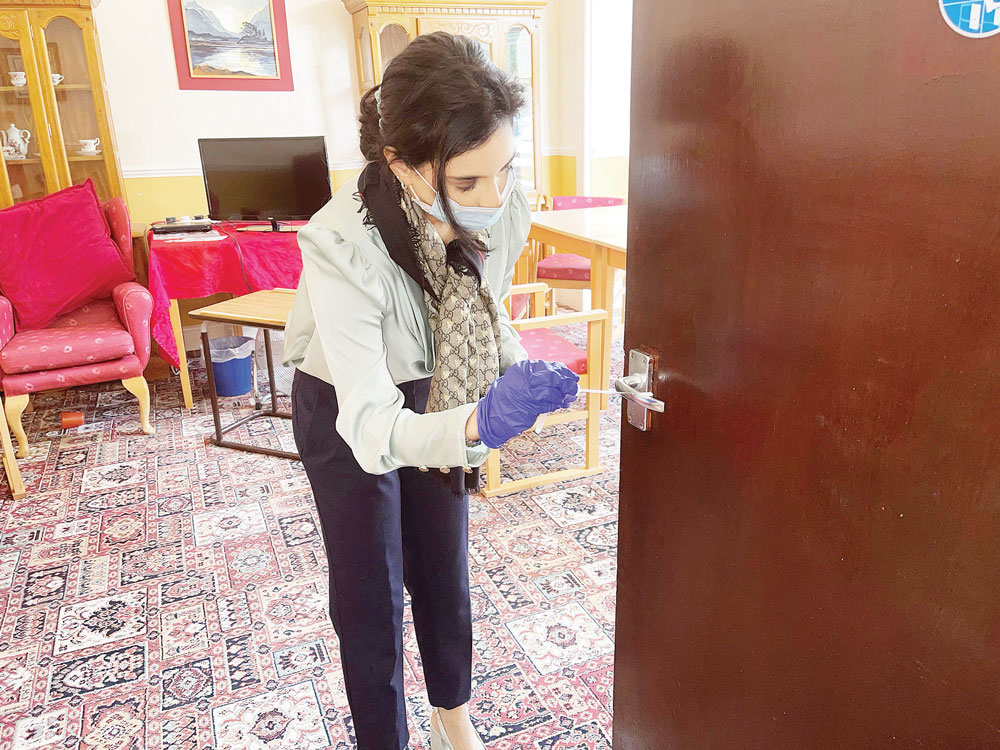
Sadia Khanom had an interest in all things scientific from an early age and this has stood her in good stead. Aged just 26, she is the founder and managing director of Voltique, a business specialising in finding solutions to problems in the disinfectant industry. Its first product, named after the business and created by Khanom, is a formula that achieves a high level of disinfection, targeting and killing all strains of pathogens including coronavirus, for up to 14 days.

Based in Little Sutton in Chester, the idea for the spray came about while Khanom was preparing for a PhD in Alzheimer’s research and neurodegeneration at the University of Chester (she has a personal interest as her grandfather was diagnosed with the disease). She had already gained a degree in biomedical science at the University of Salford and a Master’s from the University of Chester.
Personal drive
“I wanted to help people with regards to Alzheimer’s and dementia as I was 14 when my grandfather was diagnosed and there was a lot of stigma surrounding these and other degenerative disorders at the time,” says Khanom. “This was when I knew I wanted to be a scientist. My interest is in genes and genetic make-up so there was a natural drive to help with the Covid-19 pandemic as it relies heavily on genome sequencing.”
There was another motivating factor too. Khanom’s parents own Indian restaurant Café India, where Khanom herself has been working since the age of 15. With the restaurant forced to close due to lockdown, Khanom could see first-hand the devastating effects of the disease. When lockdown was first announced in March 2020, the restaurant closed for six months.
“Being a scientist, initial reports of Covid-19 sparked my interest and I wanted to find out more about the disease, and I managed to find studies and publications previously released on coronavirus,” she explains. “There were already scientists publishing their own theories on the new strain of the virus so it was a very good time to find out more. Everyone was suffering globally and my parents’ restaurant was affected too. With transmission rates being a huge factor I wanted to explore how to get these to zero, by creating a longer-lasting disinfectant that is active on surfaces and that can continually kill viruses to lower the spread.”
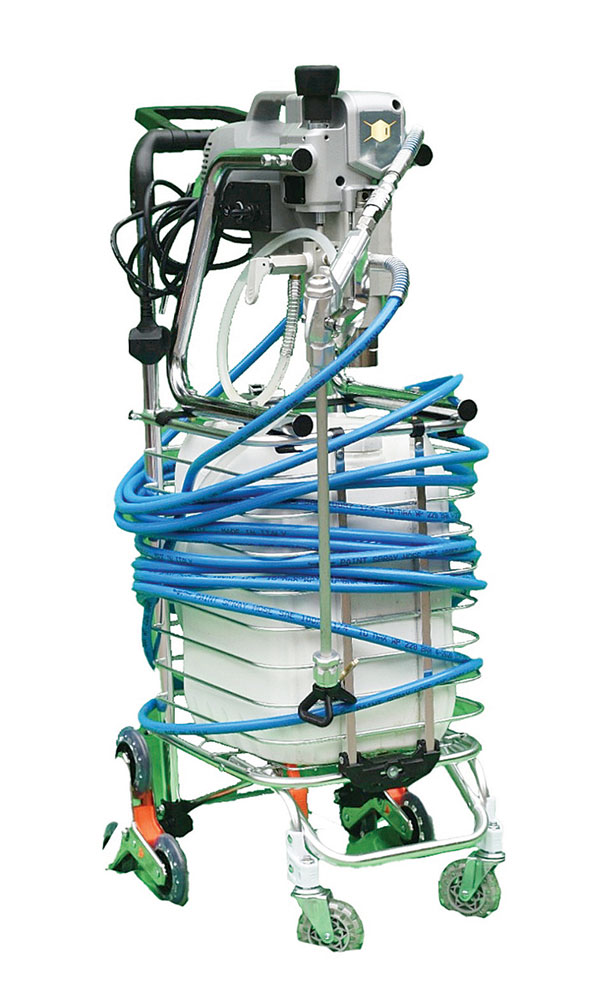

As Khanom explains, her research led her to realise that there are many limitations within the disinfectant industry, such as harsh chemicals, or products with toxicological and respiratory effects. Any project looking to stem the effects of Covid-19 can be a long process, requiring patience and determination. Khanom spent 14 months researching and developing the spray, with help from her mentor, Colin Hagan, who specialises in scientific innovation.

Family inspiration
The spray, powered by electricity and dispensed via a machine, can be used in a range of settings, from hospitals to hotels and restaurants, among others. Khanom used her parents’ restaurant as a trial venue, testing the product on different surfaces, from leather to wood to fabric. The name ‘Voltique’ is derived from ‘volt’ and ‘electric’, with Khanom saying that the idea came from the fact that living things use electricity. She credits her parents’ outlook on life and the work they have put into the restaurant for motivating her to develop the breakthrough spray.
“My parents always taught me that humanity comes first no matter who you are,” she says. “We are born in this world for a reason, to make a difference and to follow our passion. It helped that I was interested in science from a young age and my parents have been very supportive. Being the eldest child, I felt it was my responsibility to do something and give back to society. I have seen my parents work so hard building their restaurant, that from a younger generation point of view, it feels natural to want to give something back.”
Her father Kabir Ahmed has also been a great inspiration to her on the creative front, with Khanom pointing out that her parents have a great working dynamic – her mother runs the operations side while her father manages the kitchen.
“They were in different fields of work before they decided to open the restaurant – they made the move because family and friends would often say how good my father’s cooking was,” explains Khanom. “It was a hobby before it was a business, and having grown up with it, I understand just how tough an industry it is. My parents also understand this and the last thing they want is for me to be tied to this industry. They have been very supportive of how I want to make a difference.”
She adds that with the curry industry, there is a stereotype of what curries should be like and her father wanted to change that, by using high-quality ingredients and combining this with creativity.

My Father has his own style of cooking, he uses the basis of curries but puts his own twist on dishes,” says Khanom.”It’s very much a family-run restaurant, we know what our customers want and it’s great to see that sense of satisfaction when you’ve been able to offer what they like.”
Khanom’s endeavours could also help to raise the profile of female scientists, another area she is passionate about. Being young and having not been in her field of science for very long, Khanom could have encountered some opposition to her invention.
“I knew exactly what I was doing and how certain I was about my product, which then led to a lot of support,” she says. “Women are certainly becoming more recognised as scientists – it is a long-term job and there is no guarantee you can find a solution, it’s quite rare. There are many women doing a Phd but the uncertainty of the whole career puts off younger women. I hope what I have done can help encourage them, by showing what’s possible if you put your soul into something.”
With £10m worth of orders from the likes of NASA and the NHS, Khanom appears to have hit the ground running with her product. In the near future, she is looking forward to continually refining the product, and says there is interest in developing a version in a hand-held bottle. There are limitations to this, however, as the product will lose some of its benefits if it’s in a bottle rather than dispensed via machinery.
“I want to make sure there are no limitations on the product and that it is the best it can be”, she says. “I’d also like to go back to my research on Alzheimer’s and possibly mentoring. I’d love to help the younger generation to follow their dreams and passions, especially in the field of science.”
Read more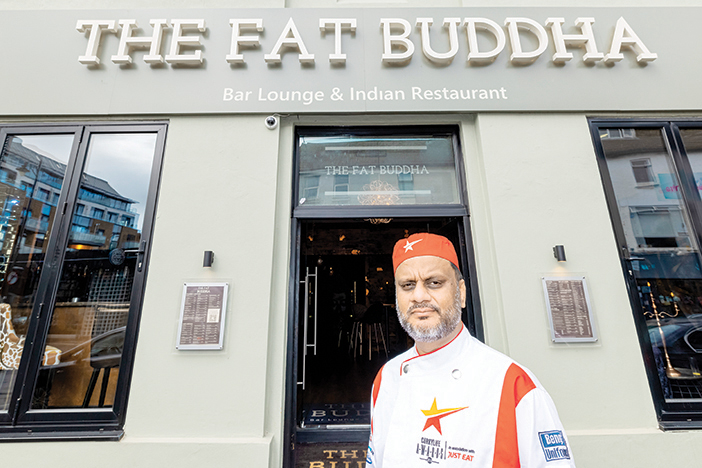
A WINNING FORMULA
Jafor Solim Uddin has been a curry chef for more than three decades and is using his creativity and his enduring passion for cooking to great effect at The Fat Buddha
There’s not much that escapes the eye of Jafor Solim Uddin, head chef at The Fat Buddha restaurant in Maidenhead. Curry Life managed to squeeze some time with him just before a mid-week evening service, but he still headed to the kitchen several times during our chat to check on his staff and a number of takeaway orders. Restaurant owner Shorif Ali describes his chef as ‘always in control’ and says that nothing gets out of the kitchen without the chef seeing it first’. He even jokes that Uddin keeps an eye on the front of house operations too.
Uddin, who prefers to go by his nickname Suhel, was originally born in England and brought up in Bangladesh, before returning to the UK in 1985. He has been at The Fat Buddha in Maidenhead for around 18 months, ever since it opened in March 2020, just prior to the pandemic. Previously, Suhel was at the original outpost of the restaurant (also called The Fat Buddha), in Berkhamsted. This one opened in 2015 and he worked there for around a year.
Suhel’s relationship with Ali goes back much further however, with the two having known each other for around 25 years – Suhel originally worked as a chef at restaurants owned by Ali’s parents. His father was also a chef, but Suhel learnt his trade from working in many other restaurants – around 15 in all before The Fat Buddha, with his longest stint at one restaurant being around 13 years.
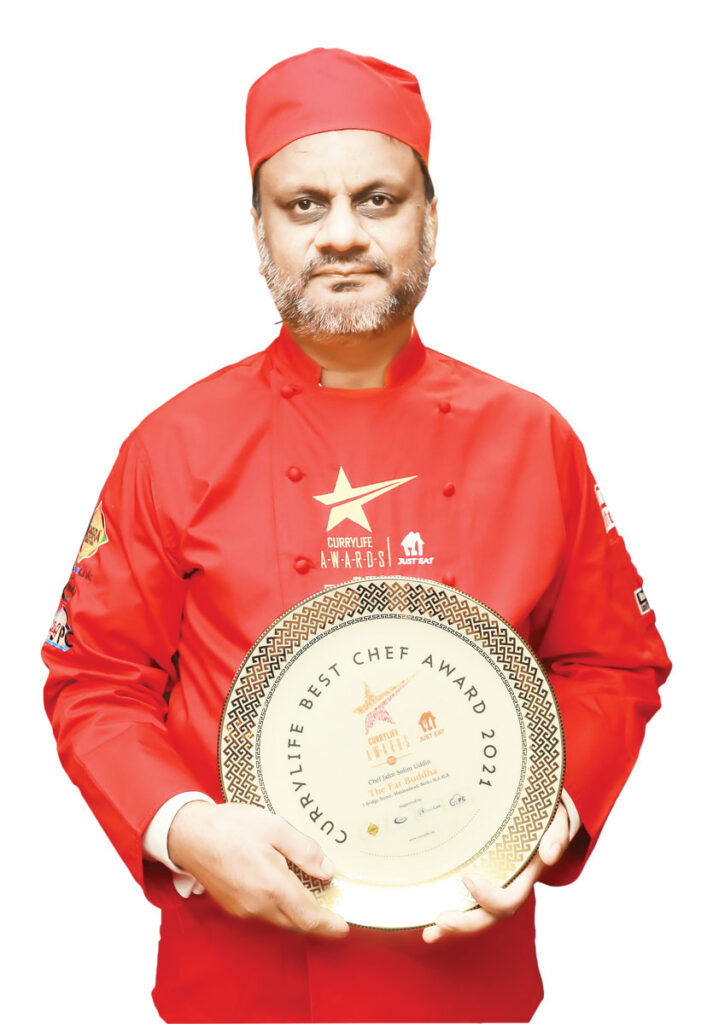
A passionate approach
Suhel doesn’t describe being a chef as a job – instead he refers to it as a passion; in the same way as people care about the food that they eat, he cares about what goes into the dishes and how they are presented. A typical day will see him arrive at the restaurant around 11am, where he oversees three other chefs, preparing base sauces and main ingredients until mid- afternoon, before getting ready for the evening service.
Suhel’s style of cooking is, in his own words, ‘not your typical Indian dishes, with food given a twist with unusual ingredients and different spicing to suit people’s palates’. Sauces are flavoured with coconut milk, pepper, coriander, garam masala and a range of spices and Suhel also makes a number of fresh chutneys.
Some of his signature and favourite dishes include King Prawn Moglai, grilled king prawns medium spiced with cashew nuts, Buddha Chicken (made with chicken fillet to ensure the meat is tender) and Tandoori Broccoli, served with yoghurt and mango sauce. Lamb Chennai, made with pepper and red chilli topped with coconut milk, is also a standout dish.
“I have tried most of the dishes we serve and if I don’t like it, it doesn’t get served,” he says. “I love cooking – it’s hard work and long hours but if you don’t enjoy it, you can’t be a good chef.”
The restaurant is located in an affluent area, with Ali saying that people are keen to not just dine but to have an experience too. The restaurant has a cocktail bar with its own mixologist, with many people arriving for drinks before moving through to the main restaurant.
Sustainable and inventive
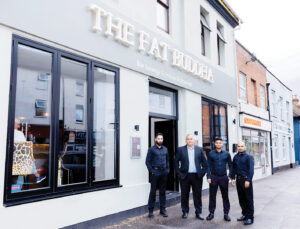
“We refresh the menu every six months and I create new dishes,” explains Suhel. “If there are some dishes that are not selling well, or which are difficult to maintain, we remove them, one example being sea bass as it was too time-consuming to prepare. Quality and maintaining consistency across the board is key to success and even after 35 years, I am not tired of the industry. My biggest challenge is finding good chefs – I’ve brought my own team with me, people I have known previously and whom I can trust. There is a big need in the curry industry to boost skills.”
Suhel also oversees The Fat Buddha’s ‘Outdoor Tandoor’ offer, which provides outdoor catering for corporate events, parties and celebrations, with Suhel providing live cooking. This runs mainly during the warmer, summer months, with a choice of four menus, while indoor event catering is available too, choosing dishes from the menu. The restaurant is also looking to be more sustainable in its approach to food, with Ali sourcing many of the ingredients from local suppliers. Vegans and vegetarians are catered for too, with dishes including Sabsi Bahar (dry mixed vegetables) and Paneer Shashlik, marinated Indian cheese, served with peppers, onions and tomatoes.
Suhel also enjoys being creative in the kitchen – customers often have requests for certain dishes, giving Suhel the chance to be inventive and to experiment with spices.
“I wouldn’t want any other job – I enjoy cooking and being in the kitchen. Sometimes you have to be demanding with your staff, sometimes you have to be soft, the important thing is to always communicate with staff and make sure that everything we do is coordinated.”
The restaurant also has a thriving takeaway service and on a busy evening (most Fridays and Saturdays) Suhel is in charge of between 90-100 covers. The Fat Buddha tries to ensure a smooth service by inviting people to enjoy drinks in the bar area and ordering a few canapé-style starters, before progressing to the main dining area. It’s a place where people like to linger and enjoy their food.
Even after 35 years in the business, and having recently won the ‘Best Chef’ award at the Curry Life Awards, held in October, Suhel is hungry for another challenge. There is the potential to become executive chef across the two Fat Buddha restaurants, overseeing the kitchens at both. Suhel is also keen to extend his skills and knowledge, and is proud of his membership of Curry Life’s Chef’s club, a networking orgnaisation for curry chefs.
“The Club is a great opportunity for learning from your peers, it can help to give you ideas to change things, and if I have any issues I want to raise, I can speak to other members,” he says.
The one thing Suhel doesn’t do is cook at home – he leaves the kitchen and the food firmly in his wife’s hands.
The Fat Buddha
3 Bridge St, Maidenhead SL6 8LR, Phone: 01628 308078
thefatbuddha.co.uk
Read more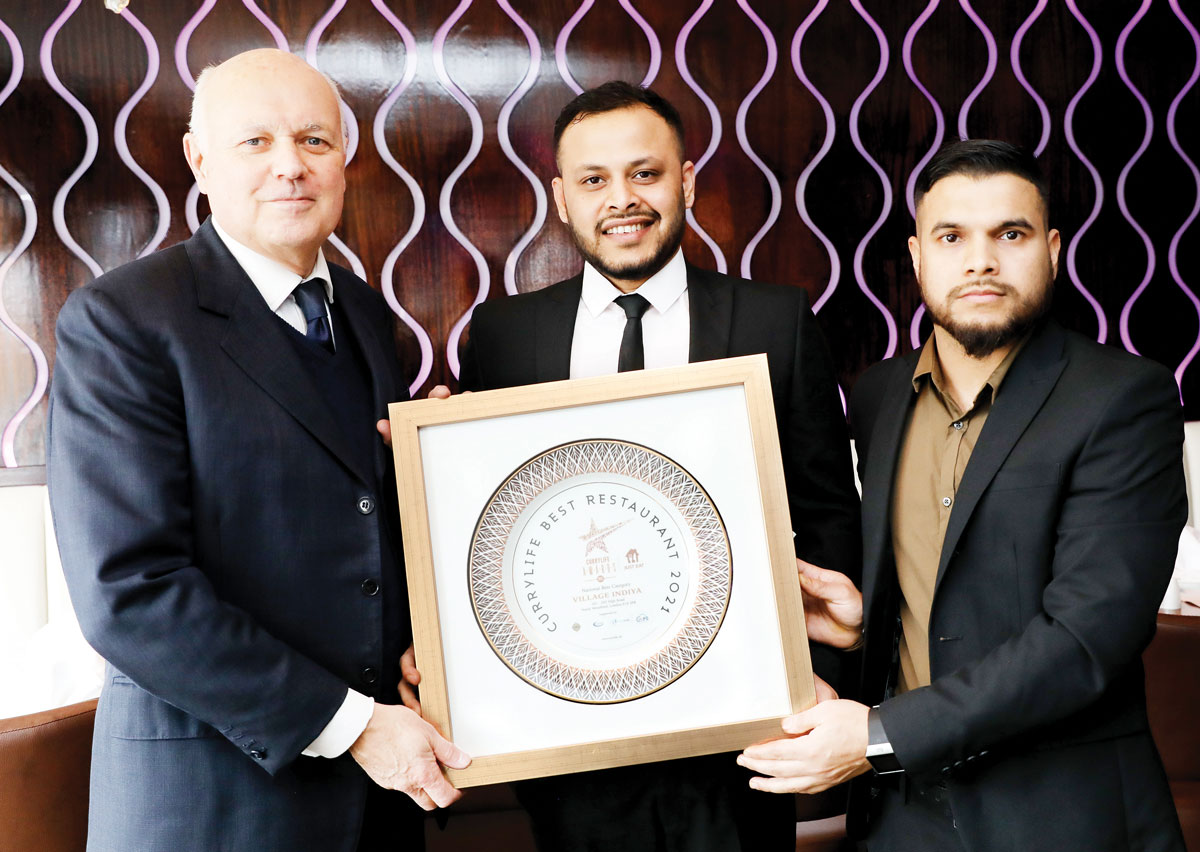
VILLAGE INDIYA PEOPLE ARE BIG HIT
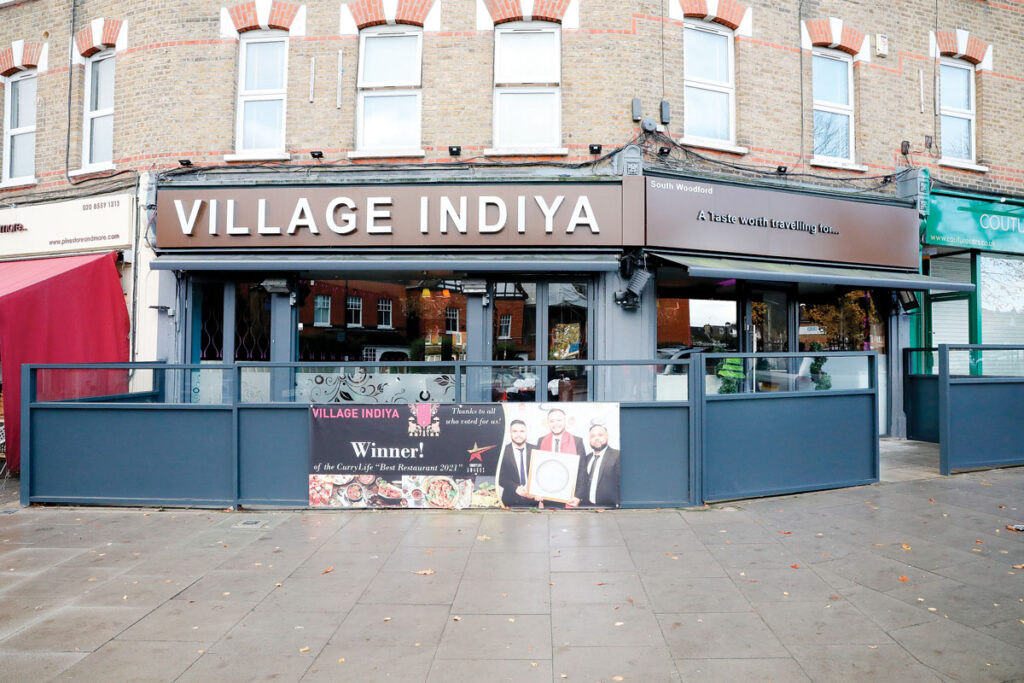
A packed restaurant on a cold, windy Thursday night. Diners queuing for a table. Solid bookings for the foreseeable future.
And all of this on the back of being named the nation’s top curry restaurant at the glittering Curry Life Awards – staged recently by this magazine in London’s West End.
Clearly owner Abi and his team at the Village Indiya restaurant in South Woodford are doing something right – so what is the secret of their outstanding success?

“Teamwork and listening carefully to our customers,” is Abi’s swift reply, as if both priorities were an absolute given for any successful restaurant anywhere in the world.
Warming to his theme, Abi adds: “Whether you’re talking about people working in the kitchen, or the staff front-of-house, it’s vital that you get the right people, with the right qualities.
“In our case our chef, Sayadur Shahin, has more than 15 years’ experience working in various restaurants and knows what works and what doesn’t. Creating new dishes that people want to eat, and blending fresh home-made ingredients, only comes with experience.”
Abi continues: “Equally, our front of house manager, Alamin Khan, is the best I know at listening to customers and tweaking our service so that we’re giving them what they want.”
He adds that although the recent lockdowns brought many challenges, they possibly reinforced the bond between the restaurant and the community it serves.
“During the lockdown,” he says, “like many restaurants in our position, we had to rely heavily on takeaway custom and, while this clearly wasn’t as good as being fully open, it enabled us to reach out to a different type of clientele.
“The proof of the pudding really has been in the eating. Clearly people liked what they ate with their takeaways and I can honestly say we’ve never been busier since we reopened.”
That’s something borne out by our visit to the restaurant, judging by the reactions of other diners on a packed 50-cover evening, and by our own meal.
We tried to sample a broad range of dishes, with our three-person party selecting a mixture of lamb, chicken and prawn dishes – in the shape of a lamb biryani, chicken dansak and king prawn tikka masala.
Impressed with a fresh take on these traditional dishes, both in terms of presentation and taste, I asked Alamin for a deeper insight into the restaurant’s approach to the needs of its customers.
“We value feedback from our customers above all else and this is key to our success. If we are giving them precisely what they want, we know they will come back and also tell their friends about us.
“This in turn feeds through to the way we approach the menu. For example, we have recently introduced some vegan based dishes due to their growing popularity.”
Alamin adds: “Also, because we know diners can tell the difference between bought-in ingredients and home-made ones, all of our spices and sauces are home-made, so that we can tweak them for our customers’ tastes.
“The same goes for service front of house. We are constantly checking that diners are happy and are giving them what they want.”
It’s a recipe for success which has been duplicated in other of the group’s restaurants in Essex – and has emboldened the Village Indiya team to open a new eatery shortly in nearby Woodford Broadway.
That is despite competition from established neighbouring Chinese and Italian restaurants.
As Abi sums up: “I can’t tell you what a wonderful feeling it is to emerge from such a terrible period as the lockdown to find, if anything, there is a stronger than ever demand for what we do and how we do it.
“The icing on the cake was to win such a prestigious prize as Best Curry Restaurant at this year’s Curry Life Awards.
“It means everything to be appreciated in this way and is confirmation that Village Indiya is going from strength to strength.”

Village Indiya
241-243 High Road, South Woodford, London E18 2PB
Tel. 020 8505 2727
www.villageindiya-southwoodford.com
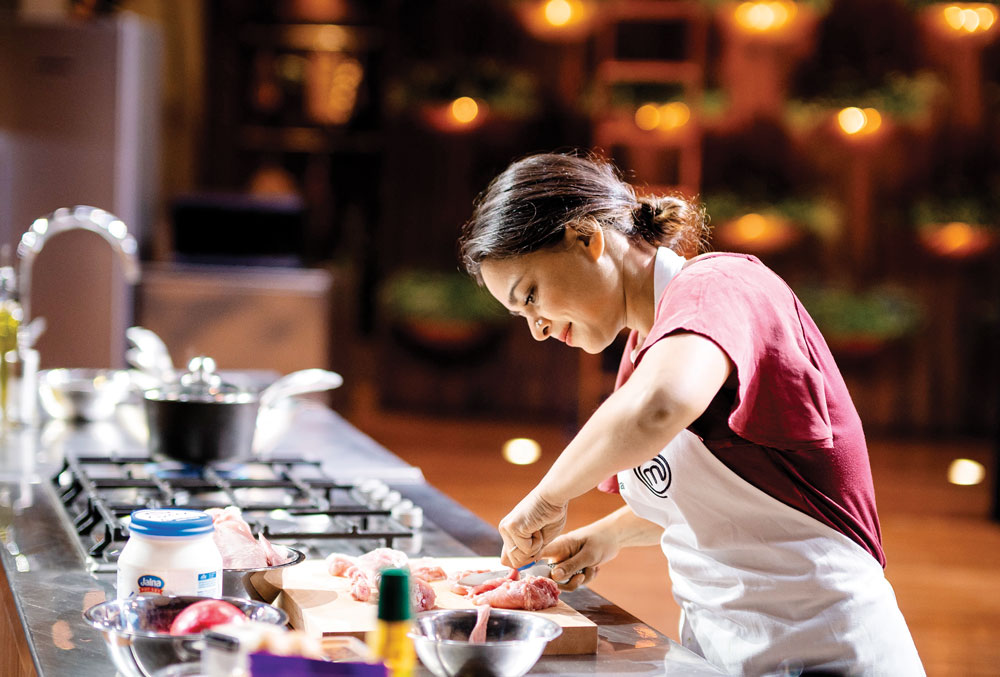
Living the dream
Masterchef Australia contestant Kishwar Chowdhury tells Curry Life about her ambition to bring Bengali food and culture to the masses
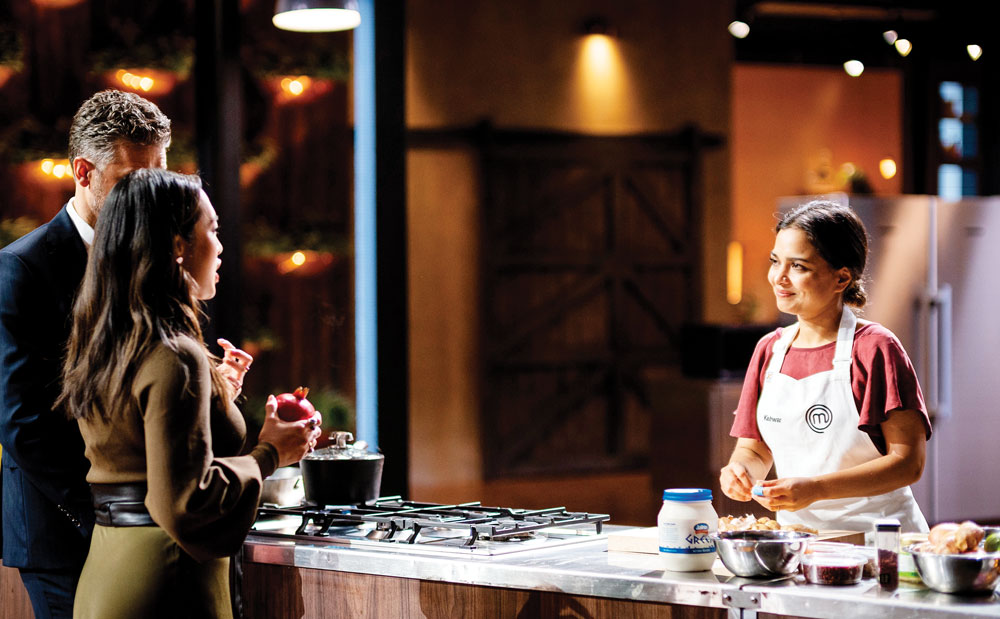
Panthabhat (fermented rice), aloo bhorta (spiced mash potato) and khashirrezala (goat meat curry) are just some of the traditional Bengali dishes that wowed television audiences this year. Prepared by MasterChef Australia contestant Kishwar Chowdhury, who placed third in the cooking competition, the dishes were both a celebration of her Bengali heritage and her love of the cuisine.
For those unfamiliar with the television series MasterChef Australia (which is different to the UK version), 24 competitors are selected following auditions. They then take part in various tasks over a number of weeks until three remain in the grand finale, undertaking three challenges over two nights. The winner is decided by the most points scored for their dishes and stands to win a grand prize of AUS $250,000, with the runner up winning AUS $30,000 and the third-placed contestant AUS $20,000. The latest series, which featured Chowdhury, aired over several months, from April to July.
Melbourne-based Chowdhury, who owns a printing business with her husband, has been cooking for as long as she can remember. One of her earliest memories is of baking with her mother, while she also recalls marking festivals and family occasions with meals around the table, with her father rustling up hearty dishes. Her desire to bring Bangladeshi culture and cooking under the spotlight stems from her heritage.
“My upbringing was very traditional, like many migrant families we really held on to our culture and food through arts and language,” recalls Chowdhury. “My mother was from India and my father from Bangladesh [where he was a freedom fighter], both were well-travelled, with my mother having visited Burma (now Myanmar), Pakistan and Afghanistan. “We had a lot of different foods on our table and for me, cooking was a creative passion.”
Chowdhury moved from Melbourne to London in 2007 to study at university and took the opportunity to travel around Europe, before heading to Bangladesh in 2010 to set up her printing business.
“When I was a young adult, travelling and living on my own, I pared down what I cooked and ate more simply,” she explains. “I found beauty and simplicity in cooking for myself and became more technical with my food and explored new flavours with my travels. My move to Bangladesh had a massive influence on my cooking. Living in Asia changed my food philosophy completely and made me aware of seasonality. If something was not in season, it was not available, and when it was, people would eat that fish or that vegetable. What seemed like a hindrance instead became a revelation and it was an important lesson.”

Industry influences
During her time away from Australia, Chowdhury cites chefs such as Anthony Bourdain and Yotam Ottolenghi as huge influences, and she emulated the latter’s cooking while in Bangladesh.
“Ottolenghi is all about those Middle Eastern ingredients, such as pulses and grains and I could easily find these ingredients in Bangladesh,” she says. “There were other interesting vegetables and it was an opportunity to learn about plant-based food. From a young age, I loved watching Anthony Bourdain, who went into uncharted territories, as well as Poh Ling Yeow [a former Masterchef Australia contestant]. She brought so much diversity to our screens and it was fantastic to see a role model like Poh embracing her heritage.”
Chowdhury returned to Melbourne in 2015 and continued with the family printing business while raising a young family. But she says she struggled to reconcile her upbringing with her heritage, and felt a desire to reconnect with Bengali culture, which led her to eventually apply for Masterchef Australia.
“My parents had worked hard to hold on to their identity and I struggled with being born and brought up in Australia and being Bengali as well,” she says. “I felt that I really needed to pass down everything they had taught me – my parents were very hands-on where food was concerned.”
Chowdhury believes representation played its part too, as she says there is not really much said about Bengalis, Bangladesh or east Indian practices, instead, it all tends to get wrapped up in Indian culture and forgotten about.
“When I was growing up, no one here knew where Bangladesh was until the cricket team started winning,” she says. “It is important for someone like me to be visible, so my children can also be seen and not be embarrassed. As my son was growing older, he was happy to take bao to school for example, but less keen to take Bengali food. It comes down to representation.”
Pursuing her passion
Chowdhury’s son prompted her to enter MasterChef Australia, an experience she describes as ‘very spur of the moment’.
“I didn’t expect to get in but when I got there [to the auditions] and they asked me what my background was, I said if there was one thing I feel passionate about it’s that Bangladeshi food is not really ‘seen’ and deserves more,” she says.
Chowdhury describes the Masterchef experience as a ‘magical place’, one that is very competitive, where you are not just cooking under time pressure but trying to stand out amongst 23 amazing cooks in the same room.
“There are very long hours and you have to dig deep and open yourself up and be vulnerable,” says Chowdury. “You also have to always be in exam mode, you have to be ready to go, whether it’s sweet or savoury or pastry, you have to get dishes prepared and be ready to cook. It’s competitive, it’s tough and a lot of pressure but extremely exhilarating. Taking part has given me a new fire in my belly.”
The experience, adds Chowdhury, taught her where her strengths lie – she admits that like many other families, she cooks a lot of everything and anything.
“I always knew Bengali food was fantastic and I love it but it’s about being open and vulnerable – you are on international television, cooking something you know is great but you don’t really see it in a restaurant, it’s not something that is known and seen in public,” she says. “Most of the time, I was doing something for the very first time on an international platform; when the judges ate it and appreciated it, this gave me the confidence to keep doing it and to back myself and say: ‘this is my food dream, it starts now’.”
Once Masterchef Australia aired, Chowdury’s Bengali dishes had millions of hits on the web and her creations were shared online by many more people, which she says goes to show that there is a place for the cuisine. The dishes she created were a combination of what her parents taught her and different cooking techniques learnt from her own experience, which helped to elevate dishes or add a twist.
“Having to cook dishes in 75 minutes was a challenge, it’s about trying to stay authentic while adopting many new techniques,” she says. “If there was something we would marinade in the tandoor, I would smoke it first with a wood apple chip finish on a hibachi or in the oven, so the flavours are punchy.”
Onwards and upwards
Since Masterchef Australia finished in July, Chowdhury has not looked back. As soon as the show finished, she started training with Michelin-star chef Masahiko Yomoda at Ishizuka, which offers fine dining with French/Japanese Kaiseki degustation menus. Chowdhury described her time there as a ‘fantastic experience’. This has since led to a collaboration with Adam D’Sylva’s modern Indian restaurant Tonka, based in Melbourne, where she released a selection of her own dishes. These included ‘Kishwar’s Charred Corn Chaat’ and ‘Kishwar’s Veal Osso Bucco Rezala’. With the restaurant booked out for much of August with diners keen to taste the menu, Chowdhury says it was ‘desperately disappointing’ when Melbourne went into lockdown, forcing the restaurant to close.
“We had one service on the night of my launch, then Melbourne went into lockdown,” she recalls. “It was very traumatic, we had worked for weeks to perfect the menu and there was a huge response, with the whole event booked out every single night in August.”
Chowdhury adapted quickly to the fast-changing situation, with the food available instead for home delivery and stocked in supermarkets.
It comes as no surprise then that at present, Chowdhury has no plans to return to the family printing business. She wants to use the momentum from the show and her experience gained to start a conversation about the importance of sharing identity and food. In the near future, Chowdhury is looking to produce a cookbook that reflects her roots and her experiences to date, and which honours the cuisine of her ancestors. It’s an idea she referred to often on the television show; having learnt her craft from her mother and her grandmother, she is equally keen to pass this knowledge on to her two children.
“I want to incorporate my food influences, places I have travelled to and been inspired by and my Bengali heritage, so I can take readers to those corners of the world,” she says.
Read more
CURRYLIFE AWARDS 2021
A night of Celebration to Remember
The Curry Life Awards returned in 2021, crowning the industry’s best chefs and restaurants
Curry and food industry professionals, politicians and special guests gathered together for the Curry Life Awards 2021, which took place this year on 10 October at the Royal Lancaster Hotel London. The glittering awards ceremony, which was last held in 2019, owing to the Covid-19 pandemic, took place following the World Curry Expo, also held at the hotel, with both events marking the end of National Curry Week.

The Curry Life Awards celebrate the unique fusion cuisine of Indian food in the UK and are part of a wider organisation that organises the British Curry Festival around the world. Close to 700 guests attended the event, which was jointly hosted by BBC breakfast sports presenter Mike Bushell and veteran broadcaster and journalist Angela Rippon.
The evening began with a tribute to those from the industry who have sadly passed away in the last year during the pandemic, before the awards were announced. A total of 46 awards were given, with restaurants and chefs recognised in a number of categories, including Best Editor’s Choice of the Year, Best Curry Chefs of the Year, Best Curry Restaurants of the Year, Best Curry Takeaways of the Year, Best Customer’s Choice of the Year and Best Curry House Supplier of the Year.

The event also paid special tribute to the founding father of Bangladesh, to mark the Mujib Centenary and Golden Jubilee of Bangladesh. The UK’s leading Bangladeshi artist and Freedom Fighter Himangshu Goswami dedicated ‘ShonoEktiMujiborerTheke’ to mark the Mujib centenary tribute.
The audience heard from headline sponsor Just Eat, Lord Karan Bilimoria, the chairman of Cobra Beer and president of the CBI and twice Michelin-starred chef Atul Kochhar, who spoke on behalf of the British Asian Trust, the nominated charity for the event. During the evening, guests were also entertained by performances from the Bollywood Dance School and enjoyed a delicious Indian-themed menu provided by Madhu’s.
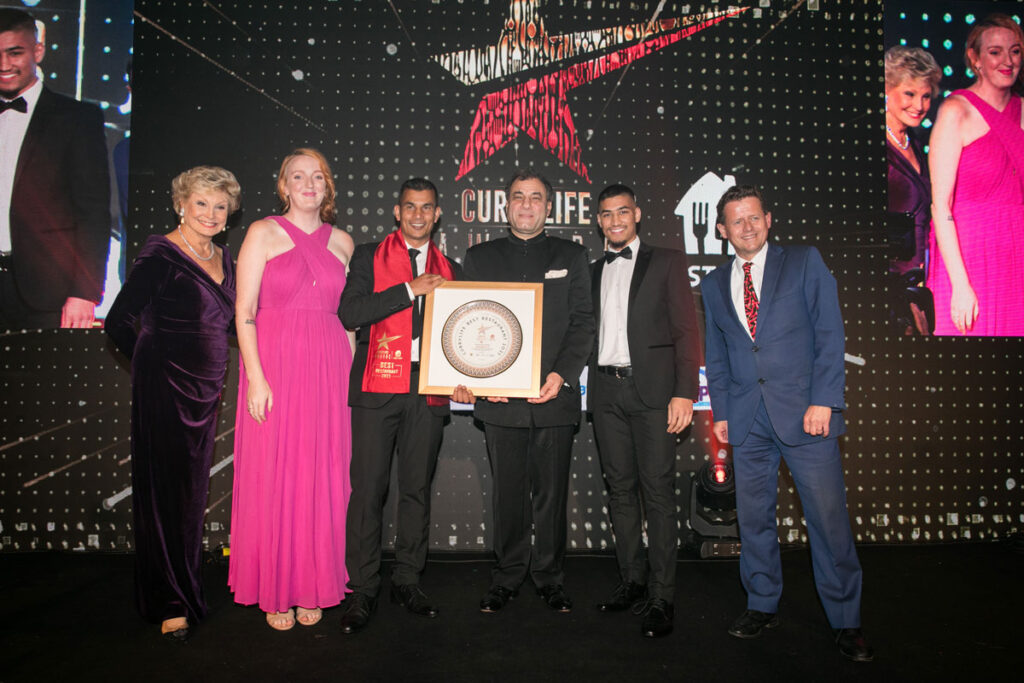
Commenting on the importance of the Awards, Lord Bilimoria said: “Like many business sectors over the past couple of years, the hospitality industry has been through the ringer because of the Covid pandemic.
“It is great to see it not only emerging from this dark period but also leading the way for other business sectors. Now that the economy is gathering momentum, it is truly heart-warming and instructive to hear of some of the stories of innovation, and pure hard work, emerging from this year’s Curry Life Awards. Well done to Curry Life for once again throwing a spotlight onto these examples of best practice and the brilliant people behind them.”
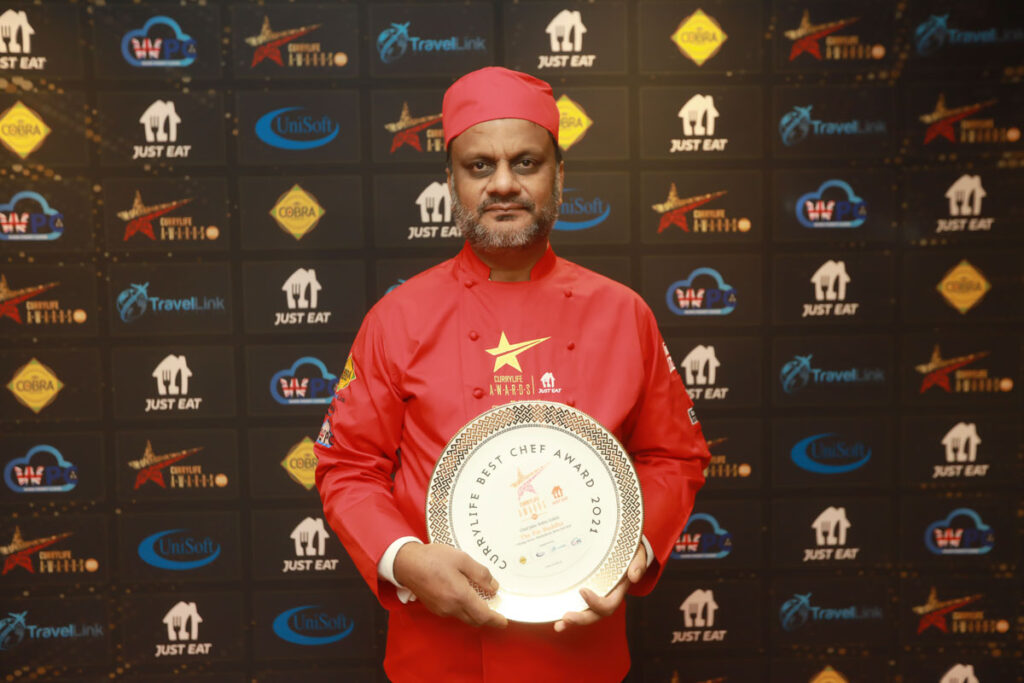
The editor of Curry Life magazine, Syed Belal Ahmed, said: “Over the years we have been staging the awards, we have seen a major stepping up of standards and quality being offered to customers-to the point where several restaurants are in a position to challenge for accolades such as Michelin stars.
“One of the major aims of the awards has always been to highlight best practice going on across the country – so that everyone has the opportunity to learn from the best – and that indeed has always been a driving principle behind Curry Life itself.”
Matt Bushby, the UK Marketing Director for Just Eat, added: “We are thrilled to sponsor the Curry Life Awards, celebrating one of our most treasured and iconic industries; one that has helped so many communities in so many ways over the last 18 months. We are delighted to play a part in showcasing the hard work and imagination of chefs and owners who continue to improve and impress in producing fantastic, value-for-money and creative cooking. Our congratulations go to all of those who have won awards. You fully deserve them for standing out in this excitingly crowded and competitive industry.”
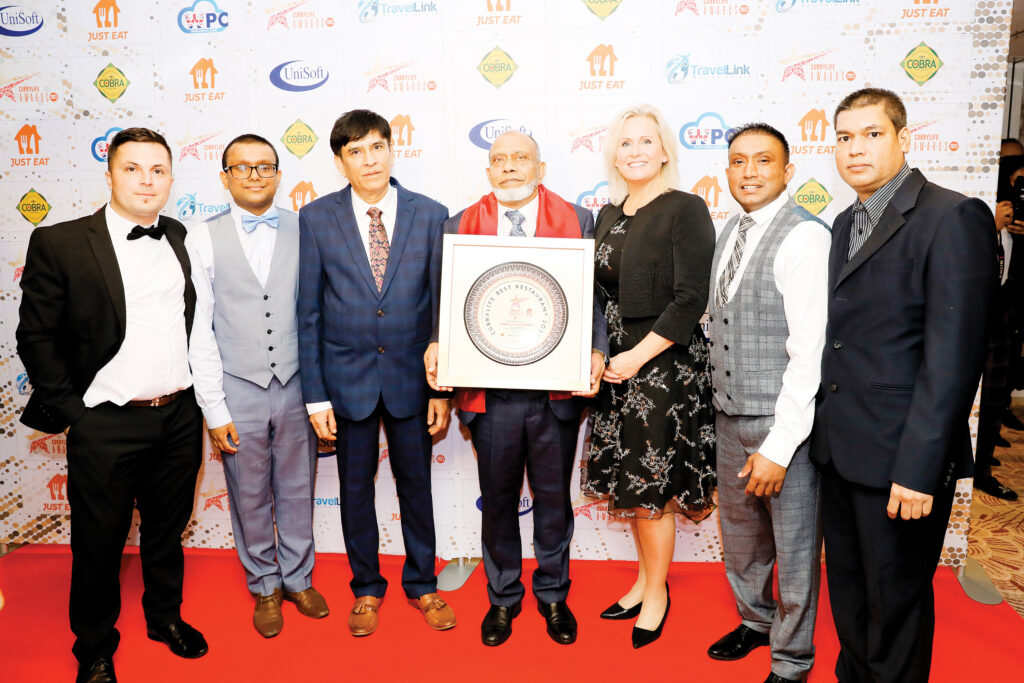
Other guests at the event included GaganMohindra MP, Aaron Bell MP, Greg Smith MP, Charlotte Nichols MP, Wes Streeting MP, chef Dominic Chapman and cookery author MridulaBaljekar.
This year’s Award Ceremony and Gala Dinner raised more than £2,000 for the British Asian Trust.
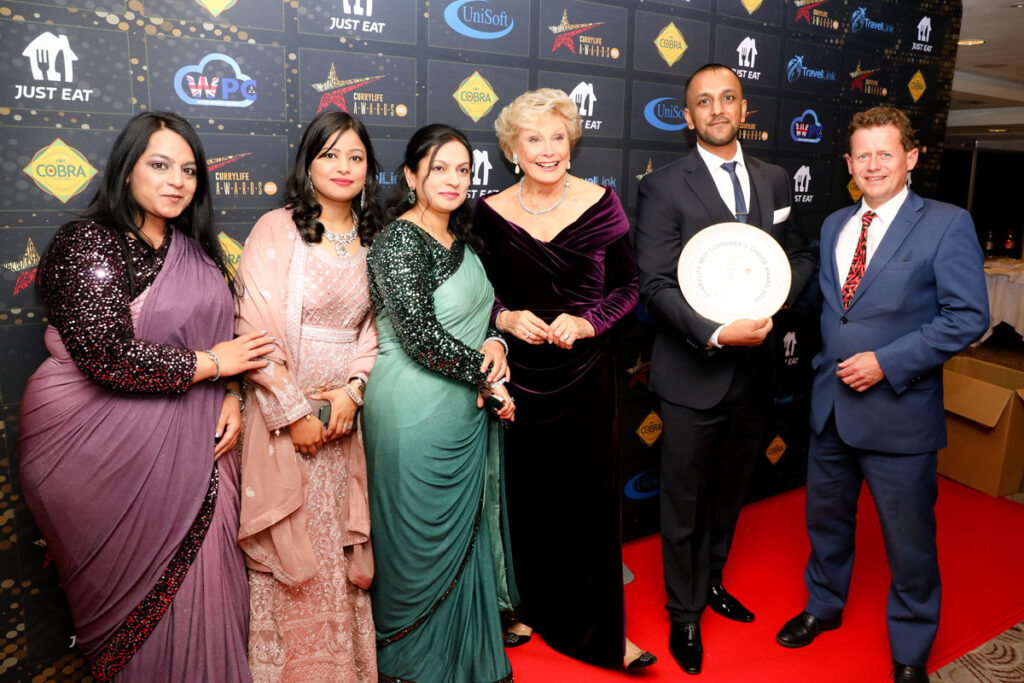
Winners are:
Best Editor’s Choice of the year
Chandini Sawbridgeworth
Radhuni, Princes Risborough
Indian Ocean, Histon, Cambridge
The Everest Abercorn, Middlesex
Best Curry Chefs of the year
- Chef JaforSolim Uddin, The Fat Buddha, Maidenhead, Berks
- Chef Majadur Rahim, Blue Tiffin, Merseyside
- Chef Mohammed Raj, Village Indian Dining, Upminster
- lChef Kabir Uddin, Hastings Spice, Sussex
- Chef Abdul Malik, Little India, Bolton
- Chef Shaz Rahman, Blue Tiffin, Stoke
- Chef Nazrul Islam, Biggles Lounge, Beds
- Chef Atikur Rahman, Chilli Green, Westcliff-on-Sea, Southend
Best Curry Restaurants of the year
- Bombay 8, Warrington 8, Cheshire
- Bombay Quay, Northwich, Cheshire
- INAGA, Westwickham, Bromley
- Westbourne Tandoori, Bournemouth
- The Fat Buddah, Berkhamsted
- Bengal Brasserie, Burley, Leeds
- Shozna, Rochester, Kent
- Monsoon Majestic, Newcastle-Under-Lyme
- Zyka, Tilehurst, Reading
- Café Spice, Darlington
- Deshi Spice, Bedford
- Taste of India, Old Hatfield, Herts
- Barton Bangla Brasserie, Preston
- Kushboo Restaurant, Barton Latimer, Kettering
- Ashuka Guildford, Surrey
- Spice Club, Bridgewater, Somerset
- Mahaan, Worthing, West Sussex
- Village Indiya, South Woodford, London
- Taj Mahal, Chippenham, Wiltshire
- Paprika Club, Leamington Spa
- Sonargaon, Whitechapel, London
Best Curry Takeaways of the year
- Love Curry, Cardiff
- Tarleton, Preston
- Fusion Foods, Markate, St Alabans
- Mya’s Spicery, Morpeth, Northumberland
- Bombay Spice, Bonnyrigg, Scotland
- Aroma, Wilmslow, Cheshire
- Baabzi, Warwick
- Pink Chilliz, Canvey Island, Essex
- Chutney Express, Castle Bromwich, Birmingham
Best Customer’s Choice of the year
- Himalaya, Bridgnorth, Shropshire
- Three Spices, Ruddington, Nottingham
- Haweli, Ealing, London
Best Curry House Supplier of the year
- Sardar Food Products
Reading Berkshire
